Bible Reference Bundle 2.0
Digital Logos Edition
Overview
Examining key questions in hermeneutics, biblical studies, preaching, history, contemporary culture, philosophy, and theology this bundle adds dexterity to your study, enabling you to engage contemporary issues more thoughtfully and scholarly discussion more knowledgably. Packed with the quality scholarship, this bundle includes the work of today’s premier Bible scholars, theologians, philosophers, and church historians. Spanning 222 volumes, this bundle adds an expansive block of resources all of these books to your library all at one—massively discounted—price.
This title is included in the following collections
You can save when you purchase this product as part of a collection.
Logos 8 Collector's Edition Le...
$11,399.99$11,399.99Logos 8 Ultimate Legacy Librar...
$21,749.99$21,749.99

- Emphasizes the work of individual scholars
- Focuses on key questions in biblical studies and contemporary theological thought
- Substantially strengthens your research capabilities
- Presents many of Eerdmans’ most influential titles and authors
With works from leading scholars such as Anthony Thiselton, Ben Witherington, Cornelius Plantinga, Lesslie Newbigin, Miroslav Volf, Fleming Rutledge, and Sergius Bulgakov, this bundle comprises individual titles and collections including:
- Miroslav Volf Collection
- Anthony C. Thiselton Collection
- Lesslie Newbigin Collection
- Biblical Interpretation Collection
- Ben Witherington Biblical Theology Collection
- Cornelius Plantinga Jr. Collection
- Reformed Thought and History Collection
- Pentecostal Manifestos Collection
- Title: Bible Reference Bundle 2
- Publisher: Eerdmans
- Volumes: 222
- Pages: 63,026
- Resource Type: Collected Works; Commentaries; Introductions; Topical
- Topic: Apologetics; Biblical Studies; Theology; Church History; Philosophy
Individual Titles
- Eerdmans Miroslav Volf Collection (6 vols.)
- Eerdmans Anthony C. Thiselton Collection (4 vols.)
- Eerdmans Lesslie Newbigin Collection (8 vols.)
- Eerdmans Biblical Studies Upgrade (16 vols.)
- Eerdmans Ben Witherington Biblical Theology Collection (6 vols.)
- Cornelius Plantinga Jr. Preaching and Theology Collection (3 vols.)
- Eerdmans Reformed Thought and History Collection (23 vols.)
- Pentecostal Manifestos Series (6 vols.)
- Calvin Institute of Christian Worship Liturgical Studies (10 vols.)
- Eerdmans Anglican Faith, Life, and Church Collection (12 vols.)
- Eerdmans Catholic Thought Collection (12 vols.)
- Early Christian Prophecy Collection (2 vols.)
- Ancient Christianity Collection (3 vols.)
- Eerdmans Christine Pohl Collection (2 vols.)
- Eerdmans Contemporary Theology Collection (4 vols.)
- Eerdmans Dorothy C. Bass Collection (3 vols.)
- Eerdmans Ecumenical Studies Collection (5 vols.)
- Eerdmans Fleming Rutledge Collection (6 vols.)
- Eerdmans George Marsden Collection (2 vols.)
- Eerdmans John Polkinghorne Collection (2 vols.)
- Eerdmans Lutheran Thought and History Collection (15 vols.)
- Eerdmans Marva J. Dawn Collection (11 vols.)
- Eerdmans Merrill C. Tenney Collection (2 vols.)
- Eerdmans Orthodox Spirituality and Faith Collection (10 vols.)
- Eerdmans Philosophical Theology Collection (4 vols.)
- Eerdmans Preaching Resources Upgrade (3 vols.)
- Eerdmans Prophetic Christianity Collection (3 vols.)
- Eerdmans Stanley J. Grenz Collection (3 vols.)
- Jewish Origins of Christianity Collection (2 vols.)
- A Handbook to Biblical Hebrew: An Introductory Grammar by Page H. Kelley, Terry L. Burden, and Timothy G. Crawford
- A Little Exercise for Young Theologians by Helmut Thielicke
- Being Consumed: Economics and Christian Desire by William T. Cavanaugh
- By the Vision of Another World: Worship in American History by James D. Bratt
- Continental Pietism and Early American Christianity by F. Ernest Stoeffler
- The Courage to Be Protestant: Truth-Lovers, Marketers, and Emergents in the Postmodern World by David F. Wells
- The Depth of the Human Person: A Multidisciplinary Approach by Michael Welker
- Evangelical Versus Liturgical? Defying a Dichotomy by Melanie C. Ross
- For Freedom or Bondage? A Critique of African Pastoral Practices by Esther E. Acolatse
- The Genesis of Doctrine: A Study in the Foundation of Doctrinal Criticism by Alister E. McGrath
- God and Marriage by Geoffrey W. Bromiley
- God and the Art of Happiness by Ellen T. Charry
- The Good of Affluence by John R. Schneider
- Handbook of Biblical Hebrew: An Inductive Approach Based on the Hebrew Text of Esther by William LaSor
- How Does America Hear the Gospel by William A. Dyrness
- How (Not) to Be Secular: Reading Charles Taylor by James K. A. Smith
- The Idea of a Christian College by Arthur Holmes
- Interpreting the Atonement by Robert H. Culpepper
- I Told Me So: Self-Deception and the Christian Life by Gregg A. Ten Elshof
- Lament for a Son by Nicholas Wolterstorff
- Missional Church: A Vision for the Sending of the Church in North America by Darrell L. Guder
- Nature, God & Pulpit by Elizabeth Achtemeier
- Pandora’s Box Opened: An Examination and Defense of Historical-Critical Method and Its Master Practitioners by Roy A. Harrisville
- The Pesharim and Qumran History by James H. Charlesworth
- Sharing Possessions: What Faith Demands, 2nd ed. by Luke Timothy Johnson
- Strangers and Pilgrims Once More: Being Disicples of Jesus in a Post-Christendom World by Addison Hodges Hart
- The Touch of the Sacred: The Practice, Theology, and Tradition of Christian Worship by F. Gerrit Immink
- Toughest People to Love: How to Understand, Lead, and Love the Difficult People in Your Life—Including Yourself by Chuck DeGroat
- Trembling at the Threshold of a Biblical Text by James L. Crenshaw
- Understanding Pietism by Dale Brown
- The Way of the (Modern) World: Or, Why It's Tempting to Live As If God Doesn't Exist by Craig M. Gay
- What’s in a Phrase? Pausing Where Scripture Gives You Pause by Marilyn Chandler McEntyre
- Witness to the Gospel by I. Howard Marshall
- Wonderful Words of Life by Mark. A. Noll and Richard J. Mouw
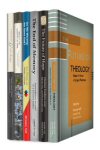
Eerdmans Miroslav Volf Collection (6 vols.)
- Publisher: Eerdmans
- Volumes: 6
- Pages: 2,678
Croatian scholar Miroslav Volf is one of the most influential theologians alive today. Volf’s contributions to interfaith dialogue have earned him the title, “theologian of the bridge.” This collection gathers six of his works that explore the broad topics in Christian living, the intersection of faith, politics, and business, and issues in how faith functions in a globalized, postmodern society.
Individual Titles:
- A Passion for God’s Reign: Theology, Christian Learning, and the Christian Self
- Against the Tide: Love in a Time of Pretty Dreams and Persisting Enmities
- Do We Worship the Same God? Jews, Christians, and Muslims in Dialogue
- The End of Memory: Remembering Rightly in a Violent World
- The Future of Hope: Christian Tradition amid Modernity and Postmodernity
- The Future of Theology: Essays in Honor of Jürgen Moltmann
Miroslav Volf is director of the Yale Center for Faith and Culture and Henry B. Wright Professor of Systematic Theology at Yale Divinity School.

Eerdmans Anthony C. Thiselton Collection (4 vols.)
- Author: Anthony C. Thiselton
- Publisher: Eerdmans
- Volumes: 4
- Pages: 1,708
Hermeneutics is one of theology’s most important fields of study, and this collection offers readers an exploration of both hermeneutical theory and its practical application to Christian theology and biblical interpretation. Arguing that hermeneutics is the “art of understanding,” Anthony Thiselton explains the history of the discipline, its application to Christian thought, and how it can be used profitably for exegesis.
Individual Titles:
- 1 Corinthians: A Shorter Exegetical and Pastoral Commentary
- Hermeneutics: An Introduction
- The Hermeneutics of Doctrine
- Life After Death: A New Approach to the Last Things
Anthony C. Thiselton is professor emeritus of Christian theology at the University of Nottingham, England.
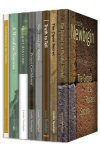
Eerdmans Lesslie Newbigin Collection (8 vols.)
- Author: Lesslie Newbigin
- Publisher: Eerdmans
- Volumes: 8
- Pages: 1,473
Explore pertinent topics in missions, discipleship, and church structure with these select works from renowned missiologist Lesslie Newbigin. A prolific author and long-time missionary, Newbigin’s works laid the foundations of the missional church movement. In this collection you’ll find works on sharing the gospel in the contemporary Western world, strategies for reaching the rest of the globe with the gospel, and studies on strife within the church. Also included is Newbigin’s commentary on John, which delves into how to share its eternal truth with a generation that rejects the existence of truth.
Individual Titles:
- Foolishness to the Greeks: The Gospel and Western Culture
- A Word in Season: Perspectives on Christian World Missions
- The Light Has Come: An Exposition of the Fourth Gospel
- Proper Confidence: Faith, Doubt, and Certainty in Christian Discipleship
- Signs amid the Rubble: The Purposes of God in Human History
- Truth to Tell: The Gospel as Public Truth
- The Open Secret: An Introduction to the Theology of Mission
- The Gospel in a Pluralist Society
Lesslie Newbigin (1909–1998) Lesslie Newbigin was born in Newcastle-on-Tyne in the United Kingdom. He studied at Cambridge and served as staff secretary of the Student Christian Movement in Glasgow, Scotland. He studied theology at Westminster College and was ordained by the Presbytery of Edinburgh, Church of Scotland, in 1926.
In 1947, Newbigin was consecrated bishop in the Church of South India. He also served on the Central Committee of the World Council of Churches. In 1959 Newbigin became the general secretary of the International Missionary Council. He oversaw the final negotiations for the merger with the World Council of Churches. In 1962, Newbigin became the first director of the Division of World Mission and Evangelism, and associate general secretary of the World Council of Churches. He was recalled as Bishop by the Church of South Indian in 1965, where he stayed until his retirement in 1974.

Eerdmans Biblical Studies Upgrade (16 vols.)
- Publisher: Eerdmans
- Volumes: 16
- Pages: 4,906
Providing multiple ground breaking monographs in, this collection equips you to engage the major themes and questions perplexing biblical scholars today. Examine key texts, and explore the history of interpretation on important biblical books, including Isaiah, Daniel, John, Romans, and more. Explore important contemporary questions, such as war, discipleship, and modern social ethics.
Individual Titles:
- The Psalms: An Introduction by James l. Crenshaw
- Listening to the Spirit in the Text by Gordon D. Fee
- A Commentary on 1 Peter by Leonhard Goppel
- Inhabiting the Cruciform God: Kenosis, Justification, and Theosis in Paul’s Narrative Soteriology by Michael J. Gorman
- Jesus of Nazareth: Lord and Christ by Joel B. Green and Max Turner
- Between Two Horizons: Spanning New Testament Studies and Systematic Theology by Joel B. Green and Max Turner
- Jesus the Word according to John the Sectarian: A Paleofundamentalist Manifesto for Contemporary Evangelism, Especially Its Elites in North America by Robert H. Gundry
- Seeking the Identity of Jesus: A Pilgrimage by Beverly Roberts Gaventa and Richard B. Hays
- Making the Old Testament Live: From Curriculum to Classroom edited by Richard S. Hess and Gordon J. Wenham
- Zion, City of Our God edited by Richard S. Hess and Gordon J. Wenham
- The Missions of Jesus and the Disciples according to the Fourth Gospel, with Implications for the Fourth Gospel’s Purpose and the Mission of the Contemporary Church by Andreas J. Kostenberger
- New Testament Social Ethics for Today edited by Richard N. Longenecker
- Perspectives Old and New on Paul: The “Lutheran” Paul and His Critics by Stephen Westerholm
- The Prophecy of Daniel by Edward J. Young
- Poetic Heroes: Literary Commemorations of Warriors and Warrior Culture in the Early Biblical World by Mark S. Smith
- The Book of Isaiah: Enduring Questions Answered Anew by Richard J. Bautch and J. Todd Hibbard
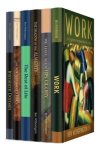
Eerdmans Ben Witherington Biblical Theology Collection (6 vols.)
- Author: Ben Witherington
- Publisher: Eerdmans
- Volumes: 6
- Pages: 1,090
Join leading New Testament scholar Ben Witherington as he examines major themes in New Testament practical and biblical theology. Examine how the Bible treats aspects of everyday life, including work, love, and recreation. Learn how worship plays a critical role in day to day living, and gain a broader understanding of what the Bible teaches about living as a Christian.
Individual Titles:
- Imminent Domain: The Story of the Kingdom of God and Its Celebration
- The New Testament Story
- The Rest of Life: Rest, Play, Eating, Studying, Sex from a Kingdom Perspective
- The Shadow of the Almighty: Father, Son, and Spirit in Biblical Perspective
- We Have Seen His Glory: A Vision of Kingdom Worship
- Work: A Kingdom Perspective on Labor
Ben Witherington is Amos Professor of New Testament for Doctoral Studies at Asbury Theological Seminary, Wilmore, Kentucky, and is on the doctoral faculty at St. Andrews University, Scotland. Witherington has twice won the Christianity Today best biblical studies book of the year award, and his many books include socio-rhetorical commentaries on Mark, Acts, Romans, 1 and 2 Corinthians, Galatians, Philemon, Colossians, Ephesians, and 1 and 2 Thessalonians.
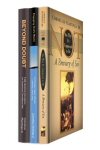
Cornelius Plantinga Jr. Preaching and Theology Collection (3 vols.)
- Author: Cornelius Plantinga Jr.
- Publisher: Eerdmans
- Publication Date: Year
- Volumes: 3
- Pages: 733
Cornelius Plantinga is an exceptional communicator and teacher. In this collection, he helps readers examine core doctrines of the Christian faith and develop a mature biblically centered worldview. Answering difficult questions about the relevance of Christianity in the contemporary world, Plantinga explains the biblical basis for the doctrine of sin, how students can develop a Christ-centered worldview, and how all Christians can live as faithful witnesses.
Individual Titles:
- Beyond Doubt: Faith-Building Devotions on Questions Christians
- Engaging God’s World: A Christian Vision of Faith, Learning, and Living
- Not the Way It’s Supposed to Be: A Breviary of Sin
Cornelius Plantinga Jr. is president emeritus of Calvin Theological Seminary, Grand Rapids, Michigan, and senior research fellow at the Calvin Institute of Christian Worship . His many articles and essays have appeared in Books and Culture, Christianity Today, and The Christian Century.
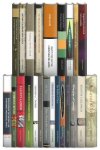
Eerdmans Reformed Thought and History Collection (23 vols.)
- Publisher: Eerdmans
- Volumes: 23
- Pages: 6,686
Eerdmans Reformed Thought and History Collection brings together 23 volumes which illuminate areas of Reformed theology such as infant baptism, stewardship of God’s creation, the Eucharist, and more. Learn from great Reformed thinkers such as John Calvin, Frans H. Breukelman, and Abraham Kuyper. Hear what contemporary theologians are saying on issues like justification. Gain insight into Reformed theology in relation to modern culture. This collection offers scholarly reflection and practical understanding for Christians today.
Individual Titles:
- The Structure of Sacred Doctrine in Calvin’s Theology by Frans H. Breukelman
- Neither Calendar nor Clock: Perspectives on the Belhar Confession by Piet J. Naudé
- Thinking with the Church: Essays in Historical Theology by Brian Gerrish
- Natural Law and the Two Kingdoms: A Study in the Development of Reformed Social Thought by David VanDrunen
- Institutes of the Christian Religion: The First English Version of the 1541 French Edition by John Calvin
- Institutes of the Christian Religion, 1536 Edition by John Calvin
- What Is Justification About? Reformed Church in an Ecumenical Theme by Michael Weinrich and John P. Burgess
- Do This in Remembrance of Me: A Ritual Approach to Reformed Eucharistic Theology by Martha L. Moore-Keish
- English Hypothetical Universalism: John Preston and the Softening of Reformed Theology by Jonathan D. Moore
- Rediscovering the Natural Law in Reformed Theological Ethics by Stephen J. Grabill
- He Shines in All That’s Fair: Culture and Common Grace by Richard J. Mouw
- Calvin’s Ladder: A Spiritual Theology of Ascent and Ascension by Julie Canlis
- Dutch Calvinism in Modern America: A History of a Conservative Subculture by James D. Bratt
- Children of Promise: The Case for Baptizing Infants by Geoffrey W. Bromiley
- Sacramental Teaching and Practice in the Reformation Churches by Geoffrey W. Bromiley
- Body, Soul, and Life Everlasting by John Cooper
- Remember Creation: God’s World of Wonder and Delight by Scott Hoezee
- The Riddle of Grace: Applying Grace to the Christian Life by Scott Hoezee
- Creation Regained: Biblical Basics for a Reformational Worldview by Albert M. Wolters
- By Oath Consigned: A Reinterpretation of the Covenant Signs of Circumcision and Baptism by Meredith C. Kline
- Principles of Conduct: Aspects of Biblical Ethics by John Murray
- Regnum Caelorum: Patterns of Millennial Thought in Early Christianity by Charles E. Hill
- Abraham Kuyper: A Centennial Reader by James D. Bratt
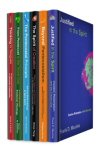
Pentecostal Manifestos Series (6 vols.)
- Publisher: Eerdmans
- Volumes: 6
- Pages: 1,632
The majority of Christians now live outside the West, with Pentecostalism being the fastest growing denomination in Asia and Africa. The Pentecostal Manifestos Series presents six volumes of theologically robust resources from this group of Christians that is transforming the world. These volumes include surveys of Pentecostal contributions to Christian philosophy, thorough treatments of the doctrine of the Holy Spirit, analysis of how science interacts with Pentecostal theology, and substantive biblical studies on Trinitarian doctrine.
Individual Titles:
- Thinking in Tongues: Pentecostal Contributions to Christian Philosophy by James K.A. Smith
- From Pentecost to the Triune God: A Pentecostal Trinitarian Theology by Steven M. Studebaker
- The Pentecostal Principle: Ethical Methodology in New Spirit by Nimi Wariboko
- The Spirit of Creation: Modern Science and Divine Action in the Pentecostal-Charismatic Imagination by Amos Yong
- Beyond Pentecostalism: The Crisis of Christianity and the Renewal of the Theological Agenda by Wolfgang Vondey
- Justified in the Spirit: Creation, Redemption, and the Triune God by Frank D. Macchia

Calvin Institute of Christian Worship Liturgical Studies (10 vols.)
- Series: Calvin Institute of Christian Worship Liturgical Studies
- Publisher: Eerdmans
- Volumes: 10
- Pages: 2,139
How we worship is a topic of endless debate, discussion, and sometimes even division, within our churches today. The Calvin Institute of Christian Worship Liturgical Studies offers resource guides, essays, and helpful reflections on ways to engage this subject and benefit your congregation. Learn how to use and pray the Psalms in your services, explore the role of visual art in worship, and examine the relationship of theology and worship. In these volumes, you’ll discover historical context and practical contemporary wisdom that will guide you through decisions regarding worship in your community.
Individual Titles:
- The Biblical Psalms in Christian Worship: A Brief Introduction and Guide to Resources by John D. Witvliet
- Primer on Christian Worship: Where We’ve Been, Where We Are, Where We Can Go by William Dyrness
- Handel’s Messiah: Comfort for God’s People by Calvin R. Stapert
- The Substance of Things Seen: Art, Faith, and the Christian Community by Robin M. Jensen
- A New Song for an Old World: Musical Thought in the Early Church by Calvin R. Stapert
- Discerning the Spirits: A Guide to Thinking about Christian Worship Today by Cornelius Plantinga Jr.
- A More Profound Alleluia: Theology and Worship in Harmony by Leanne Van Dyk
- Christian Worship in Reformed Churches Past and Present by Lukas Vischer
- Inclusive yet Discerning: Navigating Worship Artfully by Frank Burch Brown
- What Language Shall I Borrow? The Bible and Christian Worship by Ronald P. Byars
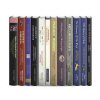
Eerdmans Anglican Faith, Life, and Church Collection (12 vols.)
- Publisher: Eerdmans
- Volumes: 12
- Pages: 3,654
This collection offers insight into Anglican theology and church life in contemporary society, gathering 13 volumes by a diverse body of scholars, writers, and theologians.
Examine the first in-depth study of the foreign missions of the Church of England. Discover three of Robert Farrar Capon’s early works. Peruse articles from distinguished church historians, literary historians, and ecumenists written in honor of the Reverend Canon J. Robert Wright. Explore the Protestant background and history of Anglican Christianity. Learn how to use prayer beads and the basic prayer structure they provide to pray through each day.
Coupling engaging topics and unique perspectives, the Eerdmans Anglican Faith, Life, and Church Collection helps readers flesh out their understanding of Anglican history and spirituality, and examine challenges the church faces in the modern age.
Individual Titles:
- Mighty England Do Good: Culture, Faith, Empire, and World in the Foreign Missions of the Church of England, 1850–1915 by Steven S. Maughan
- The Fate of Communion: The Agony of Anglicanism and the Future of a Global Church by Ephraim Radner and Philip Turner
- The Collects of Thomas Cranmer by Paul F. M. Zahl and C. Frederick Barbee
- Glorious Companions: Five Centuries of Anglican Spirituality by Richard H. Schmidt
- One Lord, One Faith, One Baptism: Studies in Christian Ecclesiality and Ecumenism in Honor of J. Robert Wright by Marsha L. Dutton and Patrick T. Gray
- The Protestant Face of Anglicanism by Paul F.M. Zahl
- God’s People in God’s Land: Family, Land and Property in the Old Testament by Christopher Wright
- A Burning and a Shining Light edited by David Lyle Jeffrey
- Reclaiming Faith: Essays on Orthodoxy in the Episcopal Church and the Baltimore Declaration edited by Ephraim Radner and George R. Sumner
- Praying with Beads: Daily Prayers for the Christian Year by Robert Farrar Capon
- The Mystery of Christ . . . and Why We Don’t Get It by Robert Farrar Capon
- The Romance of the Word by Nan Lewis Doerr and Virginia Stem Owens

Eerdmans Catholic Thought Collection (12 vols.)
- Publisher: Eerdmans
- Volumes: 12
- Pages: 4,060
The Eerdmans Catholic Thought Collection presents a wealth of insights, reflections, and challenges for Catholics, and indeed, all Christians. This is not a collection for soothing re-affirmation of the modern-day “it’s all good” mentality, but rather a powerful set of volumes that provoke you to re-think what it means to be Christian. Read the autobiography of controversial archbishop Rembert Weakland. Examine a challenge to the concept of papal infallibility. Hear two different approaches to the beloved twentieth-century theologian Hans Urs von Balthasar. Non-violence. Salvation. The new evangelization. You’ll encounter all this and more in this collection.
Individual Titles:
- A Pilgrim in a Pilgrim Church: Memoirs of a Catholic Archbishop by Rembert G. Weakland
- Papal Infallibility: A Protestant Evaluation of an Ecumenical Issue by Mark E. Powell
- Put down Your Sword: Answering the Gospel Call to Creative Nonviolence by John Dear
- Gathered for the Journey: Moral Theology in Catholic Perspective by David Matzko McCarthy and M. Therese Lysaught
- Light in Darkness: Hans Urs von Balthasar and the Catholic Doctrine of Christ’s Descent into Hell by Alyssa Lyra Pitstick
- To Follow You, Light of Life: Spiritual Exercises Preached before John Paul II at the Vatican by P. David Glenday and Bruno Forte
- Nature as Reason: A Thomistic Theory of the Natural Law by Jean Porter
- Heart of the World, Center of the Church by David L. Schindler
- Ordering Love: Liberal Societies and the Memory of God by David L. Schindler
- Being Holy in the World: Theology and Culture in the Thought of David L. Schindler by Nicholas J. Healy Jr. and D.C. Schindler
- The Worship of God: Some Theological, Pastoral, and Practical Reflections by Ralph P. Martin
- Will Many Be Saved? by Ralph P. Martin
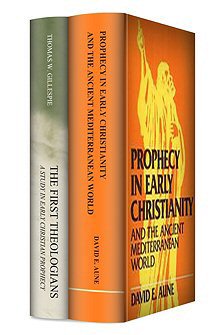
Early Christian Prophecy Collection (2 vols.)
- Publisher: Eerdmans
- Volumes: 2
- Pages: 846
Explore the history of Christian prophecy and get a biblical theology of prophecy with three influential twentieth-century theologians. Prophecy in Early Christianity provides a comprehensive treatment of first-century prophecy in the Church and contemporaneous cultural notions of prophecy. The First Theologians examines how prophets in the first century church also were its earliest theologians.
Individual Titles:
- Prophecy in Early Christianity and the Ancient Mediterranean World by David E. Aune
- The First Theologians by Thomas W. Gillespie
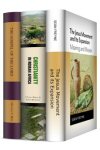
Ancient Christianity Collection (3 vols.)
- Publisher: Eerdmans
- Volumes: 3
- Pages: 1,639
Explore the growth and expansion of Christianity in its first few centuries with the Ancient Christianity Collection. Survey the historical development of the four Gospels. Examine the important, and often overlooked, role that North Africa played in early Christianity. And read an authoritative account of its development in the Greco-Roman world.
Individual Titles:
- The Gospel of the Lord: How the Early Church Wrote the Story of Jesus by Michael F. Bird
- Christianity in Roman Africa: The Development of Practices and Beliefs by J. Patout Burns Jr. and Robin M. Jensen
- The Jesus Movement and Its Expansion: Meaning and Mission by Seán Freyne
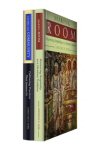
Eerdmans Christine Pohl Collection (2 vols.)
- Author: Christine Pohl
- Publisher: Eerdmans
- Volumes: 2
- Pages: 438
Discover and develop the Christian practices that create vibrant community with Christine D. Pohl’s experienced counsel. Move beyond a skeptical or romanticized picture of fellowship, and discover what it takes to truly engage and sustain real community. This collection includes Pohl’s outstanding study, Living into Community, which provides thoughtful discussion of gratitude, promise-keeping, truth-telling, and hospitality as central habits of healthy communities, helping you to develop them in your own family, church, or organization. Coupled with this volume is Pohl’s Making Room: Recovering Hospitality as a Christian Tradition. Designed for use by individuals or small groups, this volume provides a variety of ways in which people can learn more about the neglected Christian tradition of hospitality and how to live it out today.
Individual Titles:
- Living into Community: Cultivating Practices that Sustain Us
- Making Room: Recovering Hospitality as a Christian Tradition
Christine D. Pohl is associate provost and professor of Christian social ethics at Asbury Theological Seminary, Wilmore, Kentucky.
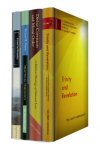
Eerdmans Contemporary Theology Collection (4 vols.)
- Publisher: Eerdmans
- Volumes: 4
- Pages: 1,021
Explore a variety of ways people are thinking about theology today with the Eerdmans Contemporary Theology Collection. Grace in Practice and Practical Theology provide systematic theologies for real life situations, offering material for pastors, counselors, parents, and anyone seeking to put biblical truth to action. David VanDrunen’s Divine Covenants and Moral Order addresses the resurgence of interest in Natural Law, studying the Bible from a Reformed perspective. And finally, Finnish theologian Veli-Matti Käkkäinen develops a constructive theology of the Trinity for a pluralistic world.
Individual Titles:
- Grace in Practice: A Theology of Everyday Life by Paul F.M. Zahl
- Practical Theology: An Introduction by Richar R. Osmer
- Divine Covenants and Moral Order: A Biblical Theology of Natural Law by David VanDrunen
- Trinity and Revelation by Veli-Matti Käkkäinen
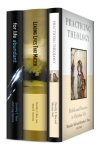
Eerdmans Dorothy C. Bass Collection (3 vols.)
- Author: Dorothy C. Bass
- Publisher: Eerdmans
- Volumes: 3
- Pages: 1,214
Focusing on practical theology, education, and ethics, the Dorothy C. Bass Collection equips readers to examine the intricate relationship between Christian living and Christian thought. Study the role of education in Christian life, and examine how a theologically informed outlook produces fruitful Christian living.
Individual Titles:
- For Life Abundant: Practical Theology, Theological Education, and Christian Ministry edited by Dorothy C. Bass and Craig Dykstra
- Leading Lives that Matter: What We Should Do and Who We Should Be
- Practicing Theology: Beliefs and Practices in Christian Life
Dorothy C. Bass is director of the Valparaiso Project on the Education and Formation of People of Faith.
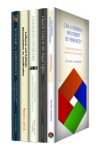
Eerdmans Ecumenical Studies Collection (5 vols.)
- Publisher: Eerdmans
- Volumes: 5
- Pages: 1,133
The Eerdmans Ecumenical Studies Collection gathers unique insights from scholars on the modern dialogue about church unity.
Discover important history with Lutheran and Catholic Reconciliation on Justification, which illuminates the evolution of the 1999 Joint Declaration on the Doctrine of Justification. In Changing Churches, you’ll benefit from a unique combination of perspectives, as two men who once communed at the same Lutheran Eucharistic table explain their similar but different decisions to leave the Lutheran faith tradition—one for Orthodoxy, the other for Roman Catholicism. Combined with an afterword by a prominent Lutheran theologian, the authors produce a vibrant dialogue as they address difficult ecumenical questions. Explore theological and ecumenical responses to Pope John Paul II’s encyclical Ut Unum Sint in Church Unity, with contributions from scholars representing Anglican, Orthodox, Lutheran, Methodist, and Evangelical traditions. And in Can a Renewal Movement Be Renewed?, examine a forward-looking assessment of the ecumenical movement by an internationally recognized leader in the church unity movement.
Individual Titles:
- Worship as Repentance: Lutheran Liturgical Traditions and Catholic Consensus by Walter Sundberg
- Lutheran and Catholic Reconciliation on Justification by John A. Radano
- Changing Churches: An Orthodox, Catholic, and Lutheran Theological Conversation by Mickey L. Mattox and A.G. Roeber
- Church Unity and the Papal Office: An Ecumenical Dialogue on John Paul II's Encyclical Ut Unum Sint by Carl E. Braaten and Robert W. Jenson
- Can A Renewal Movement Be Renewed? Questions for the Future of Ecumenism by Michael Kinnamon
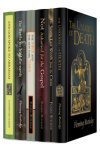
Eerdmans Fleming Rutledge Collection (6 vols.)
- Author: Fleming Rutledge
- Publisher: Eerdmans
- Volumes: 6
- Pages: 1,954
Explore the intersection of the Bible, contemporary culture, politics, and art with six volumes from celebrated Episcopalian preacher Fleming Rutledge. Rutledge’s work combines astute academic insight with an engaging voice that brings theology to life, interacting with sources ranging from the New York Times, to the Lord of the Rings. Rutledge explores central doctrines and events in the Christian faith with a thoughtful voice that speaks intelligently to all Christians. Also included are the preaching resources And God Spoke to Abraham and Note Ashamed of the Gospel, showcasing her homiletic prowess.
Individual Titles:
- And God Spoke to Abraham: Preaching from the Old Testament
- The Battle for Middle-Earth: Tolkien’s Divine Design in The Lord of the Rings
- The Bible and the New York Times
- Not Ashamed of the Gospel: Sermons from Paul’s Letter to the Romans
- The Seven Last Words from the Cross
- The Undoing of Death
Fleming Rutledge is an Episcopal priest involved in a nationwide ministry of preaching and teaching. Her books have been celebrated across denominational borders.
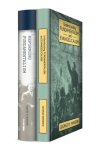
Eerdmans George Marsden Collection (2 vols.)
- Author: George Marsden
- Publisher: Eerdmans
- Volumes: 2
- Pages: 560
Untangling the complicated threads of American Protestant fundamentalism and evangelicalism, noted historian George Marsden sketches the religious landscape of twentieth-century America. Rich with colorful insights, these works lay out the development of fundamentalism and the evangelicalism that grew out of it.
Get a primer on the two religious movements with Marsden’s Understanding Fundamentalism and Evangelicalism. Marsden provides a basic roadmap to their evolution in the United States and analyzes two especially prominent and controversial themes in these traditions—views of science and views of politics. Coupled with this study is Reforming Fundamentalism: Fuller Seminary and the New Evangelicalism. Using a case study of Fuller Theological Seminary, Marsden traces the development of and distinction between fundamentalism and evangelicalism in the seminary, while examining the broader story of American Protestantism since the 1940s.
Individual Titles:
- Reforming Fundamentalism: Fuller Seminary and the New Evangelicalism
- Understanding Fundamentalism and Evangelicalism
George M. Marsden, Francis A. McAnaney Professor Emeritus of History at the University of Notre Dame, is currently a scholar in residence at Calvin College. Among his many other books is the biography, Jonathan Edwards: A Life, which received several awards, including the Bancroft Prize in history and the Grawemeyer Award in religion.

Eerdmans John Polkinghorne Collection (2 vols.)
- Author: John Polkinghorne
- Publisher: Eerdmans
- Volumes: 2
- Pages: 456
Get two works edited by a leading figure on the relationship between science and faith, John Polkinghorne. An accomplished physicist and theologian, Polkinghorne brings together the voices of scientists and theologians as they reveal the complementary relationship of theology and science. These books speak with authority, but also in a voice that clearly communicates to the non-expert.
Individual Titles:
- The Trinity and an Entangled World: Relationality in Physical Science and Theology
- The Work of Love: Creation as Kenosis
John Polkinghorne is a highly regarded scientist and theologian. He is president emeritus of Queens’ College, Cambridge and a physicist and Anglican priest. He is also a fellow of the Royal Society and was knighted in 1997. His other books include The Faith of a Physicist and Belief in God in an Age of Science.

Eerdmans Lutheran Thought and History Collection (15 vols.)
- Publisher: Eerdmans
- Volumes: 15
- Pages: 4,334
This collection gathers contributions from top Lutheran scholars on Lutheran history and theology—a must-have for anyone interested in gaining deeper insight into Martin Luther’s thought and the church’s rich heritage. Highlights include the work and thought of distinguished Lutheran theologians Carl Braaten and Gerhard O. Forde, containing not only several of their important works, but also festschrifts, and Braaten’s memoirs, Because of Christ.
In this collection, you’ll get a wealth of recent Lutheran scholarship that deepens our insight into the nuances of Luther’s thought and expands our understanding of Lutheran history and contemporary church life. Scholars including Timothy Wengert, Robert Kolb, and Eric Gritsch unpack the Luther’s doctrine of law, examine the modern Lutheran church and its place in American life, confront Luther’s writings on Jews, and look at changes in the liturgy of the Church of Sweden, asking important questions about church liturgy, history, and change relevant not only to Lutherans, but to all Christian churches. Several works included are made available in English for the first time, and including the thought of Finnish theologian Tuomo Mannermaa of Helsinki University.
Individual Titles:
- The Meaning of Christian Liturgy: Recent Developments in the Church of Sweden by Oloph Bexell
- Martin Luther’s Anti-Semitism: Against His Better Judgment by Eric Gritsch
- Because of Christ: Memoirs of a Lutheran Theologian by Carl E. Braaten
- Paths Not Taken: Fates of Theology from Luther through Leibniz by Paul R. Hinlicky
- That All May Believe: A Theology of the Gospel and the Mission of the Church by Carl E. Braaten
- Lutherans Today: American Lutheran Identity in the Twenty-First Century by Richard Cimino
- Authority Vested: A Story of Identity and Change in the Lutheran Church-Missouri Synod by Mary Todd
- Critical Issues in Ecclesiology: Essays in Honor of Carl E. Braaten by Albert L. Garcia and Susan K. Wood
- Marks of the Body of Christ by Carl E. Braaten and Robert W. Jenson
- On Being a Theologian of the Cross: Reflections on Luther’s Heidelberg Disputation, 1518 by Gerhard O. Forde
- Union with Christ: The New Finnish Interpretation of Luther by Carl E. Braaten and Robert W. Jenson
- By Faith Alone: Essays on Justification in Honor of Gerhard O. Forde by Marc Kolden and Joseph A. Burgess
- Lex Charitatis: A Juristic Disquisition on Law in the Theology of Martin Luther by Johannes Heckel
- Luther and the Beloved Community: A Path for Christian Theology after Christendom by Paul R. Hinlicky
- The Pastoral Luther: Essays on Martin Luther’s Practical Theology by Timothy J. Wengert
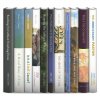
Eerdmans Marva J. Dawn Collection (11 vols.)
- Author: Marva J. Dawn
- Publisher: Eerdmans
- Volumes: 11
- Pages: 2,933
Each successive generation brings new challenges to the church. Armed with both an understanding of contemporary culture and an emphasis on traditional Christian wisdom, Marva J. Dawn addresses these new challenges, and some old ones in new garb. Among the issues Dawn covers are biblical sexuality, traditional and contemporary worship styles, modern children’s ministry, how to Sabbath in the twenty-first century, and how to culturally translate the gospel without changing the message. Also included are Dawns biblical commentary and devotional pieces on Isaiah, Romans, and Revelation.
Pastors and engaged church members will appreciate Dawn’s scholarly and eminently relevant insights into the condition of the Christian church today.
Individual Titles:
- Reaching out without Dumbing Down: A Theology of Worship for This Urgent Time
- A Royal “Waste” of Time: The Splendor of Worshiping God and Being Church for the World
- Is It a Lost Cause? Having the Heart of God for the Church’s Children
- Joy in Our Weakness: A Gift of Hope from the Book of Revelation
- Keeping the Sabbath Wholly: Ceasing, Resting, Embracing, Feasting
- Powers, Weakness, and the Tabernacling of God
- The Sense of the Call: A Sabbath Way of Life for Those Who Serve God, the Church, and the World
- Sexual Character: Beyond Technique to Intimacy
- To Walk and Not Faint: A Month of Meditations on Isaiah 40
- Truly the Community: Romans 12 and How to be the Church
- The Unnecessary Pastor: Rediscovering the Call
Marva J. Dawn is a theologian, author, musician, and educator with Christian Equipped for Ministry in Vancouver, Washington. She is also a teaching fellow in spiritual theology at Regent College.
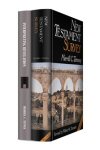
Eerdmans Merrill C. Tenney Collection (2 vols.)
- Author: Merrill C. Tenney
- Publisher: Eerdmans
- Volumes: 2
- Pages: 698
Professor of New Testament and Greek for nearly 40 years, Merrill C. Tenney’s work is packed with invaluable insight that helps readers understand the message its authors meant to convey. This collection pairs an updated version of his influential New Testament Survey with his Interpreting Revelation, which elucidates perhaps the most challenging portion of the New Testament. These resources will bolster your library with authoritative scholarship on the New Testament canon, context, and overall message.
Individual Titles:
- Interpreting Revelation
- New Testament Survey
Merrill C. Tenney (1904–1985) was dean of the graduate school and professor of Bible and theology at Wheaton College in Illinois. He was the general editor of the Zondervan Pictorial Bible Dictionary.
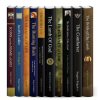
Eerdmans Orthodox Spirituality and Faith Collection (10 vols.)
- Publisher: Eerdmans
- Volumes: 10
- Pages: 2,980
Explore Orthodox theology with the writings of well-known theologians such as Sergius Bulgakov. Known as the twentieth century’s greatest Orthodox theologian, Bulgakov’s writings, and those of others in this collection, illuminate the beauty of Orthodox thought and tradition. Expertly translated into English—many for the first time—these volumes beckon readers into the exquisite intimacy with God that is characteristic of Bulgakov’s work. You’ll also experience the longing of S.L. Frank’s The Meaning of Life, renowned as the Book of Job for the twenty-first century, and contemplate God and nature with Vigen Guroian’s The Fragrance of God.
Individual Titles:
- Icons and the Name of God by Sergius Bulgakov
- Jacob’s Ladder: On Angels by Sergius Bulgakov
- The Meaning of Life by S.L. Frank
- The Burning Bush: On the Orthodox Veneration of the Mother of God by Sergius Bulgakov
- Churchly Joy: Orthodox Devotions for the Church Year by Sergius Bulgakov
- The Lamb of God by Sergius Bulgakov
- The Fragrance of God by Vigen Guroian
- The Justification of the Good: An Essay on Moral Philosophy by Vladimir Solovyov
- The Comforterby Sergius Bulgakov
- The Bride of the Lamb by Sergius Bulgakov
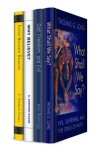
Eerdmans Philosophical Theology Collection (4 vols.)
- Publisher: Eerdmans
- Volumes: 4
- Pages: 633
Featuring work from some of the most accomplished apologists and philosophers, this collection includes four valuable works on faith in the twenty-first century. Alvin Plantinga’s God, Freedom, and Evil tackles ontology and the problem of suffering as the two greatest issues in theology. C. Stephan Evans’ Faith beyond Reason delves into the writings of Søren Kierkegaard and his Why Believe? Investigates the most common historical objections to Christianity. And finally Thomas G. Long’s What Shall We Say? addresses how pastors can practically approach theodicy using primarily the book of Job and the parable of the wheat and the tares.
Individual Titles:
- Faith beyond Reason: A. Kierkegaardian Account by C. Stephen Evans
- Why Believe? Reason and Mystery as Pointers to God by C. Stephen Evans
- God, Freedom, and Evil by Alvin Plantinga
- What Shall We Say? Evil, Suffering, and the Crisis of Faith by Thomas G. Long

Eerdmans Preaching Resources Upgrade (3 vols.)
- Authors: Michael A. Brothers and Richard Lischer
- Publisher: Eerdmans
- Volumes: 3
- Pages: 888
Explore three volumes of innovative preaching resources from two experienced preaching professors. In Distance in Preaching, professor Michael A. Brothers outlines how to prepare sermons that encourage listeners to bring their own experiences and ideas to the Bible. Richard Lischer’s The Company of Preachers draws on the wisdom of Christian preachers from across the centuries, presenting a warm and informative collection of insights on the art of preaching. And in The End of Words, Lischer reflects on how the information age and the terrible violence of the twentieth century have affected the way people respond to preaching.
Individual Titles:
- Distance in Preaching: Room to Speak, Space to Listen by Michael A. Brothers
- The Company of Preachers: Wisdom on Preaching, Augustine to the Present by Richard Lischer
- The End of Words: The Language of Reconciliation in a Culture of Violence by Richard Lischer
Michael A. Brothers is associate professor of speech communication in ministry at Princeton Theological Seminary.
Richard Lischer is the James T. and Alice Mead Cleland Professor of Preaching at Duke Divinity School.
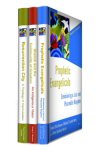
Eerdmans Prophetic Christianity Collection (3 vols.)
- Publisher: Eerdmans
- Volumes: 3
- Pages: 641
Eerdmans Prophetic Christianity series explores the complex relationship between Christian doctrine and contemporary life. Deeply rooted in the Christian tradition yet taking postmodern and postcolonial perspectives seriously, series authors navigate difference and dialogue constructively about divisive and urgent issues of the early twenty-first century. The books in the series are sensitive to historical contexts, marked by philosophical precision, and relevant to contemporary problems. Embracing shalom justice, series authors seek to bear witness to God’s gracious activity of building beloved community.
Individual Titles:
- Resurrection City: A Theology of Improvisation by Peter Goodwin Heltzel
- Shalom and the Community of Creation: An Indigenous Vision by Randy S. Woodley
- Prophetic Evangelicals: Envisioning a Just and Peaceable Kingdom by Bruce Ellis Benson, Malinda Elizabeth Berry, and Peter Goodwin Heltzel
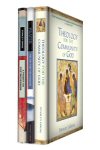
Eerdmans Stanley J. Grenz Collection (3 vols.)
- Author: Stanley J. Grenz
- Publisher: Eerdmans
- Volumes: 3
- Pages: 1,083
The Eerdmans Stanley J. Grenz Collection gathers three of the distinguished evangelical scholar’s best works to provide insightful analysis and practical guidance on important aspects of theology and Christian life.
First, Grenz’ A Primer on Postmodernism explores challenges presented to the church by the cultural shift from modernism to postmodernism, helping readers better understand exactly what postmodernism is, who its major figures are, and how its emergence must affect the way the church reaches this new generation. In Prayer, Grenz discusses petitionary prayer—showing it to be a crucial way for us to be involved with God’s work in history. He also addresses crucial questions about prayer. Drawing from a wealth of experience and wisdom, he offers practical guidance for individuals and churches looking to deepen their prayer lives. Rounding off this collection is a work of systematic theology, Theology for the Community of God, which presents the traditional themes of Christian doctrine with an emphasis on the establishment of community.
Individual Titles:
- A Primer on Postmodernism
- Prayer: The Cry for the Kingdom
- Theology for the Community of God
Stanley J. Grenz (1950–2005) was Pioneer McDonald Professor of Theology at Carey Theological College, Vancouver, British Columbia, and professor of theological studies at Mars Hill Graduate School, Seattle, Washington. He authored over 25 books, including Rediscovering the Triune God and What Christians Really Believe and Why.
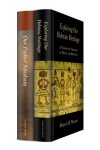
Jewish Origins of Christianity Collection (2 vols.)
- Author: Marvin R. Wilson
- Publisher: Eerdmans
- Volumes: 2
- Pages: 728
Learn more about the rich Hebrew heritage of the church with the help of distinguished Christian scholar of Judaism, Marvin R. Wilson. This collection presents two companion volumes which help readers understand the nuances of the linkage between Judaism and Christianity, between the Old and the New Testament, calling Christians to reexamine their Hebrew roots so as to effect a more authentically biblical lifestyle.
In Our Father Abraham, Wilson offers an informed theological guide to the Jewish foundations of the Christian faith. The sequel, Exploring Our Hebraic Heritage, illuminates theological, spiritual, and ethical themes of the Hebrew Scriptures that directly affect Christian understanding and experience. This collection equips readers to study and appreciate the church’s origins in Judaism with sensitive and engaging studies.
Individual Titles:
- Our Father Abraham: Jewish Roots of the Christian Faith
- Exploring Our Hebraic Heritage: A Christian Theology of Roots and Renewal
Marvin Wilson is H.J. Ockenga Professor of Biblical and Theological Studies at Gordon College in Wenham, Massachusetts. He served as the primary scholar for the television documentary Jews & Christians: A Journey of Faith.
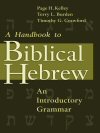
Written to facilitate study in Page H. Kelley’s widely used Biblical Hebrew: An Introductory Grammar, this handbook provides a complete answer key to the exercises in the grammar as well as practical helps, footnotes, word lists, test suggestions, and other supplementary material—all written to free up valuable class time and to aid individuals in studying Hebrew on their own.
An excellent supplement designed for use with Kelley’s grammar, Biblical Hebrew. It offers valuable support for both the student and the instructor.
—Review and Expositor
Page H. Kelley (1925–1997) was professor emeritus of Old Testament at Southern Baptist Theological Seminary in Louisville, Kentucky.
Terry L. Burden is a lecturer in humanities at the University of Louisville.
Timothy G. Crawford is dean and professor of Bible in the College of Christian studies at the University of Mary Hardin-Baylor, Belton, Texas.
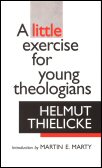
Since its first appearance in English translation in 1962, this little book has achieved near-classic status. Thousands of beginning theological students have had the opportunity to eavesdrop, as it were, on the opening lecture of a theological seminar by one of the twentieth century’s leading Christian thinkers. More experienced pastors and theologians have also returned to it again and again for the valuable insights that Helmut Thielicke brings to bear on their vocation.
To recommend this little exercise as a thin book to put in the pocket of the beginner is not enough. The more seasoned theologian will return to it, and it will touch the pastor who has long since left the halls of theological learning.
—Harvard Divinity School Bulletin
Helmut Thielicke (1908–1986) was an internationally known theologian and pastor who served as professor of systematic theology at the University of Hamburg, Germany. He wrote several books for scholars, pastors, and laypersons, including Modern Faith & Thought, Theological Ethics, and the three-volume systematic theology The Evangelical Faith.
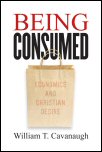
Should Christians be for or against the free market? What about globalization? How are we to live in a world of scarcity? William Cavanaugh uses Christian resources to incisively address basic economic matters—the free market, consumer culture, globalization, and scarcity—arguing that we should not just accept these as givens but should instead change the terms of the debate.
Among other things, Cavanaugh discusses how God, in the Eucharist, forms us to consume and be consumed rightly. Examining pathologies of desire in contemporary “free market” economies, Being Consumed puts forth a positive and inspiring vision of how the body of Christ can engage in economic alternatives. At every turn, Cavanaugh illustrates his theological analysis with concrete examples of Christian economic practices.
Many Christians vaguely sense that all is not well with their relation to consumer society, but find it difficult to name just what ails them. In Being Consumed William Cavanaugh offers the clearest, most helpful diagnosis I have ever seen. No liberal guilt-tripping here, just some serious theological reflection on matters like God, desire, justice, pluralism, and the nature of human freedom. I especially like Cavanaugh’s concrete examples of economic practices consistent with life in the body of Christ. This book will be required reading in my introductory theology course.
—Joseph Mangina, professor of systematic theology, Wycliffe College, Toronto
Rampaging retail therapy in our Western economics requires a radical analyst. We have an Augustinian prophetic voice in William Cavanaugh, who subjects the free market, consumer culture, globalization, and scarcity to Catholic interrogation. He employs the traditions of Augustine, Aquinas, Hans Urs von Balthasar, and John Paul II, proposing an alternative desire that transforms the church and our practices. Envisioning a eucharistic justice that leaves us rich in community-caring and prosperous in our constant sharing, Cavanaugh is lucid, personal, practical, and theologically wise.
—Gavin D’Costa, professor of Catholic theology, University of Bristol
Can a book free Christians from the ‘invisible hand’ that seems more and more to dominate every aspect of our lives? William Cavanaugh provides a much-needed how-to manual for just such a liberation. Clearly written and even entertaining, Being Consumed frees us from the ironic position of ‘having no choice’ but to live by the rules of free-market consumerism in a globalized world of scarce resources. . . Cavanaugh makes clear that the everyday economic life of Christians can be different and can make a difference. And he sows seeds that could, if taken seriously by Christians and churches, produce well over a hundredfold—produce, that is, a revolution.
—M. Therese Lysaught, associate professor, department of theology, Marquette University
Being Consumed is a thoughtful look at a difficult set of issues. I highly recommend it to anyone who wants to understand better how we might apply Christian teaching within our modern economic framework.
—Catholic Register
William T. Cavanaugh is senior research professor at the Center for World Catholicism and Intercultural Theology and professor of Catholic studies at DePaul University. His other books include The Myth of Religious Violence: Secular Ideology and the Roots of Modern Conflict and Migrations of the Holy: God, State, and the Political Meaning of the Church.
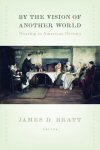
This book samples the rich variety of worship practices in American history to show how worship can be a fruitful subject for historians to study and, alternatively, how past case studies can enrich our understanding of worship today.
By the Vision of Another World gathers highly regarded historians and other scholars who usually are not read together because of the widely different subject areas in which they typically work. Yet their essays all fit together here as they address how worship, work, and worldview converge and reinforce each other no matter what particular place, era, denomination, or ethnic group is under consideration. The variety of methodologies and voices will appeal to a breadth of critical interests, while the consistently high quality of historical narrative will keep readers engaged.
This book offers a genuine contribution to multiple fields of study, including American history, liturgical studies, and practical theology. It succeeds in deeply integrating and mutually illuminating these fields with wit, warmth, and wisdom. The challenge of ranging so widely across disciplines is remarkably met and mastered. Readers will reflect meaningfully on the many particular shapes of American religion and worship in their contexts of ethnicity, culture, class, and worldview.
—Leanne Van Dyk, professor of Reformed theology, Western Theological Seminary
James D. Bratt is a scholar of Abraham Kuyper, and is currently a professor at Calvin College. An alumnus of Calvin, Bratt received his PhD from Yale University after writing his dissertation, Dutch Calvinism in Modern America. His other areas of specialty include colonial American history, and American intellectual and religious history.
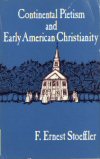
“American have been led to assume that the only significant religious impulses which have helped to shape their culture came out of Puritanism,” says editor F. Ernest Stoeffler. The expert voices in this volume reveal that an “experiential, biblical, perfectionistic, and oppositive” pietism also greatly influenced the course of American Christianity, creating a culture that prioritized conversion over theology. In Continental Pietism and Early American Christianity, editor F. Ernest Stoeffler brings together the best-known historians of American and Christian history, providing a comprehensive single volume on the subject.
F. Ernest Stoeffler is professor emeritus of religion at Temple University, Philadelphia.

“It takes no courage to sign up as a Protestant.” These words begin this bold work—the culmination of David Wells’ long-standing critique of the evangelical landscape. But to live as a true Protestant—well, that's another matter.
This book is a jeremiad against “new” versions of evangelicalism—marketers and emergent—and a summons to return to the historic faith, defined by the Reformation solas (grace, faith, and Scripture alone) and by a high regard for doctrine.
Wells argues that historic, classical evangelicalism is marked by doctrinal seriousness, as opposed to the new movements of the marketing church and the emergent church. He energetically confronts the marketing communities and their tendency to try to win parishioners as consumers rather than worshipers, advertising the most palatable environment rather than trusting the truth to be attractive. He takes particular issue with the most popular evangelical movement in recent years—the emergent church. Emergents, he says, are postmodern and postconservative and postfoundational, embracing a less absolute understanding of the authority of Scripture than traditionally held.
The Courage to Be Protestant is a forceful argument for the courage to be faithful to what Christianity in its biblical forms has always stood for, thereby securing hope for the church’s future.
David F. Wells is the Andrew Mutch Distinguished Professor of Historical and Systematic Theology at Gordon-Conwell Theological Seminary. An ordained Congregationalist minister, he is also the author of more than a dozen previous books.
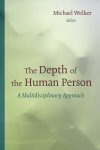
This volume brings together leading theologians, biblical scholars, scientists, philosophers, ethicists, and others to explore the multidimensionality and depth of the human person. Moving away from dualistic (mind-body, spirit-flesh, natural-mental) anthropologies, the book’s contributors examine human personhood in terms of a complex flesh-body-mind-heart-soul-conscience-reason-spirit spectrum.
The Depth of the Human Person begins with a provocative essay on the question “Why is personhood conceptually difficult?” It then rises to the challenge of relating theological contributions on the subject to various scientific explorations. Finally, the book turns to contemporary theological-ethical challenges, discussing such subjects as human dignity, embodiment, gender stereotypes, and human personhood at the edges of life.
Michael Welker is professor and chair of systematic theology and executive director of the Research Center for International and Interdisciplinary Theology at the University of Heidelberg, Germany. His previous books include The Spirit in Creation and New Creation and The Work of the Spirit.
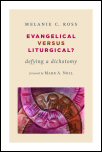
Why is there such a deep divide between evangelical and liturgical churches, especially when it comes to worship? How did this unfortunate evangelical-liturgical dichotomy develop, and what can be done about it?
In this book Melanie Ross draws on historical analysis, systematic theology, and the worship life of two vibrant congregations to argue that the common ground shared by evangelical and liturgical churches is much more important than the differences than divide them.
As a longtime evangelical church member who is at the same time a teacher of liturgical studies, Ross is well qualified to address this subject, and she does so with passion and intelligence.Evangelical versus Liturgical? is an important addition to the scant literature explaining nondenominational worship practices to those from more historically established liturgical traditions.
Melanie Ross’s Evangelical versus Liturgical? is a highly readable, carefully written, and critically important challenge to a dichotomy that the church has assumed far too easily.
—Jeremy Begbie, Thomas A. Langford Research Professor of Theology, Duke University
This is a book that many of us have been waiting for. It is winsome without being wishy-washy; critical yet profoundly charitable. Above all it is both sharp and wise. Instead of the usual invitation for evangelicals to grow up and become ‘liturgical,’ Ross empowers free-church evangelicals to see the liturgical wisdom already implicit in their practices—and presses liturgical theologians to appreciate the same. In doing so, she also invites evangelicals to become newly intentional about worship by drawing from the deep wells of liturgical theology. This book is a win-win-win.
—James K.A. Smith, author,Imagining the Kingdom: How Worship Works
Drawing upon her careful analysis of detailed case studies, and with keen knowledge of ritual and liturgical studies, Melanie Ross opens up a refreshing new chapter in liturgical theology. Clearheaded, wise, and important, this book is a major resource for anyone concerned about contrasts and convergences in worship practice.
—Don E. Saliers, William R. Cannon Distinguished Professor of Theology and Worship Emeritus, Emory University
An important work that speaks to today’s churches. . . . The fresh vision provided in this book will change discussions about worship in congregations, in ecumenical groups, and among scholars.
—Karen B. Westerfield Tucker, professor of worship, Boston University
Focusing more on the connections and less on the dichotomies between evangelical and liturgical churches, this illuminating book by Melanie Ross provides a timely and theologically profound description of evangelical worship. . . . Offers a groundbreaking, fascinating, and balanced understanding of the relationship between evangelicalism and contemporary liturgical Christianity. . . . Brilliant and refreshing.
—Nathan D. Mitchell, associate director for research and publications, Notre Dame Center for Liturgy
With biblical studies, theology, liturgical studies, and field research on her palette, Melanie Ross paints a nuanced, insightful picture of worship practices in our day. A tremendous resource for those engaged in ministry for whom worship practices and ecumenical relations are important, this is also a vital book for those who study the contemporary church in North America, offering new categories and definitions for their research.
—Todd E. Johnson, professor emeritus of theology, Fuller Theological Seminary
This book is a passionate, heartfelt cry for embracing commonalities among all Christian churches while not ignoring the differences that may exist between liturgical and evangelical traditions. Ross calls for us to seek ‘local middle ground’ in order to overcome the false liturgical/evangelical dichotomy. Her call should resonate with all worshipping communities.
—James R. Hart, president, Robert E. Webber Institute for Worship Studies
Melanie C. Ross is assistant professor of liturgical studies at Yale Divinity School and Yale Institute of Sacred Music.
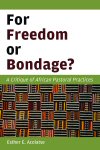
In Ghana today, many people who suffer from a variety of human ills wander from one pastor to another in search of a spiritual cure. Because of the way cultural beliefs about the spiritual world have interwoven with their Christian faith, many Ghanaian Christians live in bondage to their fears of evil spiritual powers, seeing Jesus as a superior power to use against these malevolent spiritual forces.
In For Freedom or Bondage? Esther Acolatse argues that Christian pastoral practices in many African churches include too much influence from African traditional religions. She examines Ghana’s Independent Charismatic churches as a case study, offering theological and psychological analysis of current pastoral care practices through the lenses of Barth and Jung. Facilitating a three-strand conversation between African traditional religion, Barthian theology, and Jungian analytical psychology, Acolatse interrogates problematic cultural narratives and offers a more nuanced approach to pastoral care.
In this thoughtful, carefully researched, and much-needed book Esther Acolatse enters into critical engagement with African Christian pastoral practices, especially ‘deliverance’ ministries. . . . Her robust theoretical and practical approach, illustrated with actual contextual cases, avoids the dangers of over-spiritualization, under-psychologizing, and cultural irrelevance, which have marred effective care of souls in contemporary African cultures. . . . It should be required reading for all who have pastoral and educational responsibilities for persons influenced by African cultures.
—Emmanuel Y. Lartey, L. Bevel Jones III Professor of Pastoral Theology, Care, and Counseling, Candler School of Theology, Emory University
This is an important book. With the increasing significance of Africa within contemporary Christianity, new and urgent theological issues are arising for pastoral practice as African understandings of the spirit world interact with the biblical materials and traditional Christian practice. Acolatse is beginning a much-needed conversation between African and Western theologians, with huge pastoral implications.
—Andrew F. Walls, professor of history of missions, Liverpool Hope University, Akrofi-Christaller Institute, Ghana
Acolatse’s proposals provide a holistic and dialogical model for pastoral care, one that engages with the ecumenical tradition and is informed by interdisciplinary analyses, while also expertly reappropriating global South perspectives, sensibilities, and cosmologies. May an increasingly Pentecostal and charismatic world Christianity take heed.
—Amos Yong, professor of theology, Regent University School of Divinity
Esther E. Acolatse is assistant professor of the practice of pastoral theology and world Christianity at Duke Divinity School.
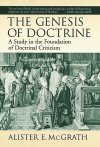
What is doctrine? How can a doctrinal statement made in the past have any authority in the modern period? How should doctrinal statements be evaluated and criticized? These questions are of central importance to Christian theology and have important consequences for the church. In the course of its extensive historical and theological analysis, this study presents a detailed investigation of the development of Christian doctrine and the nature of doctrine itself.
This groundbreaking study, based on the prestigious 1990 Bampton Lectures delivered at Oxford University, explores the reasons why doctrine is a necessary aspect of Christian existence and examines some of the factors that govern its development.
Alister E. McGrath begins with a critical engagement with the views of George Lindbeck on the nature of doctrine before moving on to present a fresh understanding of the nature and function of Christian doctrine within the church. Particular attention is paid to the way in which doctrine acts as a demarcator between communities of faith, allowing important insights to contemporary ecumenical debates.
McGrath also explores the critically important issue of the authority of the past in Christian theology, focusing especially on the manner in which doctrine serves as a means of maintaining continuity with the past heritage of the Christian tradition. The book represents an exploration of a “middle way” in relation to the significance of Christian doctrine, rejecting both those approaches that insist on the uncritical repetition of the doctrinal heritage of the past and those that reject the authority of past doctrinal formulations. McGrath concludes his work by considering whether doctrine has a future within the church, and he answers this question in the affirmative on the basis of a number of important theological and cultural considerations.
Alister McGrath is professor of theology, ministry, and education, and head of the center for theology, religion, and culture at King’s College, London. He is a prolific author noted for his ability to explore and express complex ideas in simple terms. His three most recent books are Mere Apologetics, Christianity’s Dangerous Idea, and (with Joanna Collicutt McGrath) the international bestseller, The Dawkins Delusion?.
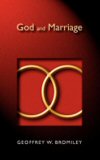
Offering a new look at the increasingly unfashionable institution of marriage, Geoffrey Bromiley presents here a timely theological study which, unlike others books on marriage, aims exclusively to relate marriage to God as creator, Son, and Holy Spirit. Bromiley observes that God’s work of reconciliation makes it possible for his people also to achieve reconciliation with one another, particularly in the marriage relationship.
In addition to thoroughly discussing the relationship of the Trinity to marriage, Bromiley examines such topics as incest, adultery and fornication, celibacy, the permanency of marriage, and remarriage after the death of a partner.
I am very pleased with the book and feel it will fill a very special place in the available literature on Christian marriage. . . It stands apart from the superficial writing that all but characterizes our time. How-to books are of little value apart from the basic theological understanding which must precede them. This is a book I would like to have written. . . Will be required reading for my students.
—Thomas Howard, professor of history, Gordon College
Bromiley pays close, cautious, and sensitive attention to virtually every Scriptural passage about marriage, even the passages that are particularly difficult for our own era to cope with. He makes no attempt to rewrite the Bible in the interest of some specially modern idea. Rooted deeply in the immeasurable principles of creation and redemption, this book is full of sane, courageous, sound teaching.
—Dwight Small, emeritus associate professor of sociology, Westmont College
Geoffrey W. Bromiley (1915–2009) was professor emeritus of church history and historical theology at Fuller Theological Seminary in Pasadena, California. He is best known as the translator of numerous theology texts, including Theological Dictionary of the New Testament. He is also the editor of International Standard Bible Encyclopedia and coeditor of Barth’s Church Dogmatics.
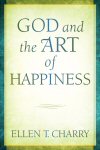
Western Christians are generally skittish about happiness, observes Ellen Charry. They live in the hope of heaven but are somewhat nervous about experiencing too much joy this side of paradise. Charry’s God and the Art of Happiness questions this way of thinking, reviewing the history of the theological conversation about happiness and offering a constructive proposal for considering it anew.
After taking an introductory look at ancient Greek philosophy, Charry surveys the treatment of God and happiness throughout the history of Christian thought, from Saint Augustine through the eighteenth century. She then explores the biblical vision of happiness in the Pentateuch, Psalms, Proverbs, and the Gospel of John, clearly showing how the Bible encourages the happiness and flourishing that accompany obedience to the creator. For those living in the beauty of holiness and divine love, she argues, this world is no “vale of tears”—and there need be no conflict between pleasure and piety, between goodness and happiness.
Rising from the ashes of deep personal pain and loss, this highly original theology of the Christian life offers comfort, encouragement, and healing for all who long to experience true happiness here and now.
Ellen Charry has the gift of making deep connections between theology and ordinary life. In happiness she has identified a wonderful theme through which to explore some of the heights and depths of human existence. She revels in her topic and constantly draws the reader into fruitful, wise reflection on important matters.
—David F. Ford, regius professor of divinity, University of Cambridge
A frequently voiced complaint today is that academic theology writes only for its own guilds and too often tumbles into an ugly and lazy jargon-ridden abstraction. In this subtle, nuanced book, born from both hope and personal anguish, Ellen Charry reconnects knowledge and healing, thereby responding to a deep need.
—Iain R. Torrance, professor of patristics, Princeton Theological Seminary
This original and powerfully argued book is destined to become a standard cite for scholars of theology and ethics. Ellen Charry critically reviews the idea of happiness in Scripture and tradition, with a particularly interesting analysis of Anglican divine Joseph Butler. What makes the book memorable, however, is its innovative teaching of ‘asherism.’ Asherism avoids the dangers of self-denying agapism and self-serving eudaemonism by confirming our perennial need to love God, neighbor, and self at once and to live out our lives and vocations by the letter, spirit, and telos of both the law and the gospel.
—John Witte Jr., director, Center for the Study of Law and Religion, Emory University
Ellen T. Charry is Margaret W. Harmon Professor of Theology at Princeton Theological Seminary. She earned a PhD in religion from Temple University following an MSW from Yeshiva University and BA from Barnard College. Charry’s interest is in the Christian life, and her books include By the Renewing of your Minds, Inquiring after God, and God and the Art of Happiness. From 1998 to 2010 she was a member of the Theology Committee of the House of Bishops of the Episcopal Church. Currently serving as an editor at large for the Christian Century, Charry has also served on the editorial boards of the Scottish Journal of Theology and Pro Ecclesia, and was formerly editor of Theology Today.
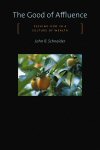
How should Christians live in a material world? Should personal guilt accompany financial success? Is wealth incompatible with true Christianity? In The Good of Affluence John R. Schneider reopens the debate over the proper Christian attitude toward money, arguing that Scripture supports the responsible possession of wealth.
This is a provocative book of Christian theology, written to help people seeking God in a culture that has grown from modern capitalism. By comparing classic Christian teaching on wealth with the realities of our modern economic world, Schneider challenges the common presumption that material affluence is inherently bad. His careful interpretation of Scripture narratives—creation, exodus, exile, and more—shows that abundance is the condition that God envisions for all human beings and that faithful persons of wealth are part of this plan.
Through insightful engagement with the biblical text Schneider overturns some of the most cherished and unquestioned assumptions of influential Christian writers (particularly Ronald Sider) on modern capitalist affluence. Yet Schneider's message is also finely balanced with the need for responsible Christian living. He offers wealthy Christians biblical affirmation, but also challenges them to a life shaped by an uncommon sense of stewardship, generosity, and compassion.
Incisive, thought-provoking, and biblically grounded, The Good of Affluence is a superb resource for anyone—students, professors, businesspeople, general readers, discussion groups—wishing to grapple seriously with the subject of faith and wealth.
John R. Schneider is professor emeritus of religion and theology at Calvin College. He was formerly professor of religious studies at Westmont College, California. He has written widely on Christianity and wealth, and is the author of Philip Melanchthon’s Rhetorical Construal of Biblical Authority and Godly Materialism: Rethinking Money and Possessions.
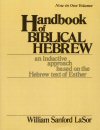
The Handbook of Biblical Hebrew, designed as a complete tool for the student of Biblical Hebrew, is the result of over 25 years of teaching the language. While it is primarily intended for use in Hebrew courses, it is also an excellent tool for a refresher course or useful as a basic grammatical reference work to aid the exegete.
Similar in format to William LaSor’s Handbook of New Testament Greek, it combines reading lessons (vol. 1) with grammar, paradigms, and basic vocabulary (vol. 2). William LaSor uses the inductive method, studying directly from the text, rather than the conventional method of language study in which beginning students learn the rules of grammar and syntax and memorize vocabulary, often without reading the actual text. Instead of memorizing numerous forms that will never be encountered in actual reading, the student learns only what he or she encounters.
The lessons are based on the Hebrew text of Esther, chosen because it presents little difficulty in theological or textual matters and has an excellent vocabulary. LaSor has included readings from other portions of the Bible, such as several chapters from Genesis, to introduce the student to Hebrew other than that found in Esther.
The diligent student of this method will learn not only the elements of Hebrew but also how to inductively study the language and how to learn by induction what the Hebrew text says.
William Sanford LaSor (1911–1991) was a former professor emeritus of Old Testament at Fuller Theological Seminary in Pasadena, California.
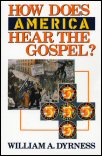
In this book William A. Dyrness explores the relationship between the biblical gospel and American culture. He shows how three dominant American cultural values—pragmatism, optimism, and individualism—have both a positive and negative impact on our Christian discipleship, looks at Walter Rauschenbusch and Robert Schuller as case studies, and sets out a distinctively American way of appropriating the gospel.
This is a profound study of how the gospel relates to the North American context. Dyrness combines cross-cultural sensitivities with theological astuteness and a solid grasp of American experiences and traditions. His brief analysis of Robert Schuller’s ‘contextualized message’ is simply brilliant! I recommend this book with much enthusiasm.
—Richard Mouw, former president, Fuller Theological Seminary
As an astute observer of American culture and an able theologian, Dyrness brings the biblical text to bear on the modern context. A learned work with evangelical power.
—Gabriel Fackre, Abbot Professor of Christian Theology Emeritus, Andover Newton Theological School
An illuminating survey of the interaction between the gospel and American society through the centuries and an assessment of their present relations.
—Lesslie Newbigin, author, Foolishness to the Greeks: The Gospel and Western Culture
William A. Dyrness is professor of theology and culture at Fuller Theological Seminary. His books include Reformed Theology and Visual Culture, Senses of the Soul, and A Primer on Christian Worship.
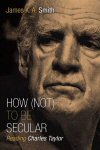
How (Not) to Be Secular is what author Jamie Smith calls “your hitchhiker's guide to the present.” It is both a reading guide to Charles Taylor’s monumental work A Secular Age and philosophical guidance on how we might learn to live in our times.
Taylor’s landmark book A Secular Age (2007) provides a monumental, incisive analysis of what it means to live in the post-Christian present—a pluralist world of competing beliefs and growing unbelief. James K.A. Smith’s book is a compact field guide to Taylor’s study of the secular, making that very significant but daunting work accessible to a wide array of readers.
Even more, though, Smith’s How (Not) to Be Secular is a practical philosophical guidebook—a manual of how to live in our secular age. It offers an adventure in self-understanding and maps out a way to get our bearings in today’s secular culture, no matter who “we” are—believers or skeptics, devout or doubting, self-assured or puzzled and confused. This is a book for any thinking person to chew on.
Charles Taylor’s crucial book on our secular age is inaccessible for most people, including the church leaders who desperately need to learn from its insight. Jamie Smith’s book is the solution to this problem. As a gateway into Taylor’s thought, this volume (if read widely) could have a major impact on the level of theological leadership that our contemporary church is getting. It could also have a great effect on the quality of our communication and preaching. I highly recommend this book.
—Tim Keller, Redeemer Presbyterian Church, New York City
This is a brilliant, beautifully written book on the dilemma of faith in a modern secular age. It introduces the reader to the material in Taylor’s dense book, of course, but it does more. It invites the reader on a journey through the experience of the spirit in different centuries, and how our conceptions of mind and person shape belief in ways far more intimate than we usually imagine. How (Not) to Be Secular is a gem.
—T.M. Luhrmann, professor of anthropology, Stanford University
Charles Taylor’s daunting tome, A Secular Age, has just turned a great deal less intimidating. Combining his usual lucid style, his love for literature, and his passion for the church’s future, Jamie Smith offers a faithful guide through the pages of Taylor’s monumental work. Along the way, he wisely cautions his co-religionists against facile responses to the ‘disenchantment’ of modernity, but he also insists that the Christian faith may have much more going for it than many recognize.
—Hans Boersma, J.I. Packer Professor of Theology, Regent College
James K.A. Smith is professor of philosophy at Calvin College in Grand Rapids, Michigan, where he also holds the Gary and Henrietta Byker Chair in Applied Reformed Theology and Worldview. He is the editor of Comment magazine. Smith has authored or edited many books, including Imagining the Kingdom and the Christianity Today Book Award winners Who’s Afraid of Postmodernism? Taking Derrida, Lyotard, and Foucault to Church and Desiring the Kingdom . He is also editor of the Church and Postmodern Culture Series .
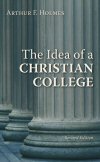
The Idea of a Christian College has become, in the prophetic words of Nicholas Wolterstorff, “a classic, a standard.” Widely used by students, lay readers, teachers, and administrators, it provides a concise case for the Christian college and defines its distinctive mission and contribution.
This edition is extensively revised and includes two new chapters: “Liberal Arts as Career Preparation” and “The Marks of an Educated Person.”
Arthur F. Holmes (1924–2011) was professor emeritus of philosophy at Wheaton College in Wheaton, Illinois. His many influential books on philosophy and Christian higher education include All Truth Is God’s Truth, Shaping Character: Moral Education in the Christian College, and Building the Christian Academy.
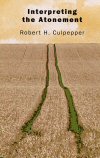
In this widely praised volume, Robert H. Culpepper places the doctrine of atonement at the center of the Christian faith and examines it against the background of a biblical understanding of sin. Culpepper presents the Old Testament foundations, the New Testament witness, and various historical interpretations of atonement. He concludes with a constructive statement of the doctrine that will serve the reader as well as a guide to a deeper understanding of Christianity and its practice in today’s world.
Robert H. Culpepper served as a Southern Baptist missionary and seminary teacher in Japan for over 30 years before returning permanently to the United States in 1980. He is professor emeritus at Southeastern Baptist Seminary, Wake Forest, North Carolina.
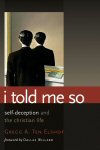
Think you’ve ever deceived yourself? Then this book is for you. Think you’ve never deceived yourself? Then this book is really for you.
Scripture is peppered with talk of self-deception and its poisonous effects on the pursuit of holy living. Christians in the past thought long and hard about the ways we deceive ourselves. They called on self-deception to explain a wide range of problems in Christian experience. Strangely, though, self-deception has all but disappeared from our consciousness today. We rarely admit to the possibility of deceiving ourselves in any area of our lives.
In I Told Me So, Gregg Ten Elshof reintroduces readers to self-deception and offers an explanation for its recent neglect in Christian thought. He describes conditions that tempt us to deceive ourselves and points out where they exist in contemporary Christian life. He explains the most successful strategies we use in self-deception and offers practical advice on how to confront and eliminate them. But readers will be surprised to discover that self-deception isn’t always such a bad thing. Ten Elshof shows how sometimes it can even be a useful, God-given gift.
Honest and incisive, consistently wise and frequently funny, I Told Me So offers fresh insights on how we deceive ourselves and smart strategies to combat the deceiver in all of us.
Ten Elshof’s discussions are erudite, biblical, searching, and laced with soul-restoring wisdom. All of this together means that this book is solidly pastoral. What it brings to us is appropriate to individuals, but it especially belongs in the context of small groups and local congregations.
—Dallas Willard, former director, School of Philosophy, University of Southern California
Gregg A. Ten Elshof is associate professor and department chair of philosophy at Biola University. He is also the author of Introspection Vindicated.
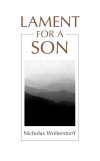
Well-known Christian philosopher Nicholas Wolterstorff has authored many books that have contributed significantly to several disciplines. But in Lament for a Son, he writes not as a scholar but as a loving father grieving the loss of his son.
With a moving honesty and intensity Wolterstorff explores all the facets of his experience of this irreversible loss, using brief vignettes. Though he grieves “not as one who has no hope,” he finds no comfort in the pious-sounding phrases that would diminish the malevolence of death.
The book is in one sense a narrative account of events—from the numbing telephone call on a sunny Sunday afternoon that tells of 25-year-old Eric’s death in a mountain climbing accident, to a graveside visit a year later. But the book is far more than narrative. Every event is an occasion for remembering, for meditating, for Job-like anguish in the struggle to accept and understand.
A profoundly faith-affirming book, Lament for a Son gives eloquent expression to a grief that is at once unique and universal—a grief for an individual, irreplaceable person. Though it is an intensely personal book, Wolterstorff decided to publish it, he says, “in the hope that it will be of help to some of those who find themselves with us in the company of mourners.”
Lament for a Son is a simple, honest, and poignant expression of one man’s grief, but it is more. By sharing the depths of his grief, not in trite phrases but honestly, Nicholas Wolterstorff helps open the floodgates for those who cannot articulate their pain. . . . This little book is a true gift to those who grieve and those who, in love, reach out to comfort. Wolterstorff’s words are, indeed, ‘salve on our wounds.’ Thank God he did not remain silent.
—Henri J. M. Nouwen, author, The Return of the Prodigal Son: A Story of Homecoming
Wolterstorff inquires as Job inquired. He is honest and utterly resistant to the cheap answers about death: finally, to any answers about death at all. . . . He looks, without foolish giddiness or delusion, but in faith, to the day that death and this death shall be overcome—and he takes his place beside all who suffer. . .
—Walter Wangerin Jr., senior research professor, department of English, Valparaiso University
Read him, and again I say unto you, please read him.
—Martin E. Marty, Fairfax M. Cone Distinguished Service Professor Emeritus of the History of Modern Christianity, University of Chicago Divinity School
This book is destined to become a classic. . . . It is a book of questions in the face of death, searching for how to go on, living without a loved one. . . . He expresses both the evil of death and the face of God in and through death. It is a poem to life that expresses the numbness of death, the isolation of grief, the silence and yet suffering of God, finding meaning in the suffering. This is a book to read over and over and over.
—Journal of Psychology & Christianity
For the gift of this personal meditation, the Christian community should offer profound gratitude. Perhaps once or twice a year—in a good year—one reads a book so compelling, so essential, that one wishes to advise all friends, ‘Here, please read this book. It’s wonderful.’ Simple and profound, Lament for a Son is such a book.
—Christianity Today
Nicholas Wolsterstorff is Noah Porter Professor Emeritus of Philosophical Theology at Yale University and senior fellow at the Institute for Advanced Studies in Culture at the University of Virginia. Before coming to Yale he was professor of philosophy at Calvin College in Grand Rapids, Michigan, for 30 years.
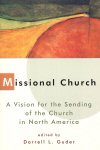
What would a theology of the Church look like that took seriously the fact that North America is now itself a mission field? This question lies at the foundation of this volume written by an ecumenical team of six noted missiologists—Lois Barrett, Inagrace T. Dietterich, Darrell L. Guder, George R. Hunsberger, Alan J. Roxburgh, and Craig Van Gelder.
The result of a three-year research project undertaken by The Gospel and Our Culture Network, this book issues a firm challenge for the church to recover its missional call right here in North America, while also offering the tools to help it do so.
The authors examine North America’s secular culture and the church’s loss of dominance in today’s society. They then present a biblically based theology that takes seriously the church’s missional vocation and draw out the consequences of this theology for the structure and institutions of the church.
This stimulating volume challenges its readers to re-examine two fundamental concepts: their understanding of the nature of the church and their understanding of mission. . . . This book is a must-read not only for missiologists but also for pastors and anyone interested in the renewal and revitalization of the church as it enters a new millennium.
—Missiology
This is a book worthy of study and consideration, especially for those who take seriously the changes that have impacted culture and church in North America. It is a provocative work that pleads for significant renewal of ‘Communities of the Holy Spirit’ in face of established institutions that have become accommodated to the American way of life.
—Interpretation
Darrell L. Guder is Henry Winters Luce Professor of Missional and Ecumenical Theology at Princeton Theological Seminary.
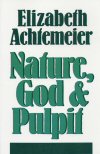
Nature, God, and Pulpit collects and interprets the biblical texts on the relationship between God and creation. Designed for the church body and especially for preachers, this book is particularly timely because, as Elizabeth Achtemeier points out, few subjects have been more neglected and less examined by American pulpits than the relation between nature and God.
Elizabeth Achtemeier offers in this thoroughly researched and cogently written work a telling homiletical corrective to contemporary preaching’s penchant for avoiding conversation about the relationship between God and the natural world. With both polemics and apologetics, Achtemeier exposes pantheistic and New Age heresies. Here critique and solution are presented biblically, theologically, and practically with specific advice to the modern preacher on how science, nature, and the gospel can be held together in creative tension in the modern pulpit. Without question I consider this book to be a landmark study on this subject.
—William J. Carl III, author, Preaching Christian Doctrine
Achtemeier writes with both a flair and a passion. She moves sure-footedly through Old and New Testament materials in shaping and sharing a comprehensive understanding of creation. . . . Offering solid biblical exegesis, scientific awareness, and reflective meditation, she enables a contemporary person to perceive creation as theocentric. One learns, participates, and worships in the reading of this insightful material.
—Stanley A. Nelson, senior professor of theology, Golden Gate Baptist Theological Seminary
Elizabeth Achtemeier was adjunct professor of Bible and homiletics at Union Theological Seminary in Virginia.
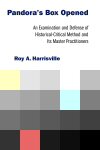
Pandora’s Box Opened: An Examination and Defense of Historical-Critical Method and Its Master Practitioners
- Author: Roy Harriville
- Publisher: Eerdmans
- Publication Date: 2001
- Pages: 368
For many, the historical-critical method has released a host of threats to Christian faith and confession. In Pandora’s Box Opened, however, Roy Harrisville argues that despite the evils brought upon biblical interpretation by the historical-critical method, there is still hope for it as a discipline.
Harrisville begins by describing the emergence and use of the historical-critical method. He then attends to the malaise that has come over the method, which he says still persists. Finally, Harrisville commends a version of the historical-critical method, shorn of its arrogance. He claims that the method and all its users comprise a “Pandora’s Box” that, when opened, releases “a myriad other pains,” but hope still remains.
Roy Harrisville has long studied biblical interpretation and thought much about it. This book presents the results—insights both deeply thoughtful and comprehensive in scope. Congratulations are in order.
—Robert W. Jenson, professor of religion, Institute for Theological Inquiry
Roy A. Harrisville is professor emeritus of New Testament at Luther Seminary, St. Paul, Minnesota.
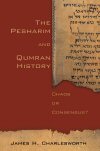
Since their discovery among the Dead Sea Scrolls, the Pesharim have sparked intense debate. Are these ancient documents biblical commentary, or are they historiographies alluding to figures and events of the time? James H. Charlesworth demonstrates that these 16 books do indeed contain historical allusions and relates these references to a synopsis of Qumran history. This book also includes appendixes by Lidija Novakovic giving an index of biblical quotations as well text-critical variants in the Pesharim, other commentaries, and related documents.
James Charlesworth has produced yet another valuable volume for the ongoing and ever-increasing library on the Dead Sea Scrolls. This indispensable book provides a thoroughgoing commentary on the Pesharim, the early Jewish commentaries on the Hebrew Bible. Charlesworth is a faithful reporter of the scholarly battlefield, and he steers a moderate middle course among the treacherous minefields in which the Scrolls have been lodged ever since their discovery. Charlesworth is sound and safe and solid, citing the best authorities and hewing to the established lines in Dead Sea Scrolls scholarship. Thus he brings us up to date on the issues and their likely resolutions, and he prepares us for the future completion of current labors and the possible and hoped-for consensus regarding the main chronological and historical events in the experience of the people of Qumran.
—David Noel Freedman, endowed chair in Hebrew biblical studies, University of California, San Diego
Charlesworth explores the understanding of Scripture that the Jewish sectarians at Qumran had and the way they read and applied Scripture to their time in history. They lived in the tumultuous period of Roman oppression just before the rise of Christianity, and they had essentially the same hermeneutics of Scripture as the New Testament writers? That is, they believed that the Bible addresses the end time, that they were living in the last days, and that Scripture therefore spoke directly to their situation. Charlesworth’s study starkly illumines the same kind of hermeneutics evident in present-day Christian eschatological sects. The appendixes by Lidija Novakovic of biblical quotations and textual variants are alone worth the price of the book.
—James A. Sanders, Ancient Biblical Manuscript Center, Claremont, CA
This illuminating study of the Pesharim is a major contribution to the fields of Second Temple Judaism and early Christianity. In a masterful manner Charlesworth goes through the texts and analyzes them against the backdrop of Hellenistic and Jewish historiography as well as of biblical literature. The book is brilliantly written and should be read by scholars and the general public. It is a learned and important scholarly book, but it is also a very enjoyable book to read.
—Doron Mendels, professor, history department, Hebrew University of Jerusalem
James H. Charlesworth is George L. Collord Professor of New Testament Language and Literature and director of the Dead Sea Scrolls Project at Princeton Theological Seminary. He has authored or edited over 60 books. Charlesworth is an international recognized expert in Apocrypha and Pseudepigrapha of the Old and New Testaments, the Dead Sea Scrolls, Josephus, Jesus research, and the Gospel of John.
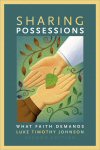
Respected scholar Luke Timothy Johnson challenges Christians to change the way they regard their worldly goods. He writes, “this book is written as an exercise in theological reflection on one of the knottiest questions imaginable: the connection between being a Christian and the way we own and use things. . . . When we turn to thinking about money and possessions, we find ourselves in murky waters. The things we own and use, like our sexuality, lie close to the bone of our individual and collective sense of identity.”
Stepping purposefully into the “murky waters” of owning and sharing, Johnson endeavors to define the slippery concept of human possession—especially in relation to God’s divine ownership—and to unpack the Bible’s teaching on the mystery of human possessing and possessiveness.
This second edition, reflecting 30 years of Johnson’s further thinking on the subject, features chapters expanded with fresh insights, helpful new study questions, and a substantial new epilogue.
All who found in Luke Johnson’s treatment of possessions as part of the mystery of human existence a deeper and more fruitful approach to the ‘problems’ of wealth and poverty will find in this new edition continued critical reflection and fresh insight. Those for whom this is a first encounter will find out what made it worth reissuing after 30 years.
—Sondra Ely Wheeler, Martha Ashby Carr Professor of Christian Ethics, Wesley Seminary
Luke Timothy Johnson is R.W. Woodruff Professor of New Testament and Christian Origins at Candler School of Theology, Emory University. His books include The Creed: What Christians Believe and Why It Matters and Brother of Jesus, Friend of God: Studies in the Letter of James. He is the winner of the 2011 Grawemeyer Award in Religion for his Among the Gentiles: Greco-Roman Religion and Christianity.
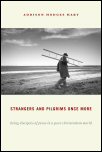
In this book, Addison Hodges Hart articulates some crucial questions for contemporary Christians: What sort of church must we become in today’s post-Christendom world, where we can no longer count on society to support Christian ideals? What can we salvage from our Christendom past that is of real value, and what can we properly leave behind? How do we become “strangers and pilgrims” once more, after being “at home” in Christendom for so long?
Summoning readers to wise and faithful discipleship in our post-Christendom age, Hart suggests both how Christ’s disciples can say “yes” to much that was preserved during the age of Christendom and why they should say “no” to some of the cherished accretions of that passing epoch.
This excellent book is both clear and courageous! It describes the fundamental changes that must take place for re-forming the Christianity that most of our denominations have accepted as the only available model of church. Addison Hodges Hart honors history, Scripture, and theology—and puts them together very wisely.
—Richard Rohr, founder, Center for Action and Contemplation, Albuquerque, New Mexico
Thoughtful Christians often lament that our leaders are characterized by ignorance on fire on the one hand and intelligence on ice on the other. In Addison Hodges Hart, however, we have intelligence on fire. In Strangers and Pilgrims Once More he makes bold and sensible proposals for a positive and robust Christian discipleship. I have great respect for this author and this book.
—Brian D. McLaren, author, We Make the Road by Walking
Addison Hodges Hart is a retired pastor and college chaplain presently living in Norway. He is also the author of The Ox-Herder and the Good Shepherd, Taking Jesus at His Word, and The Yoke of Jesus.
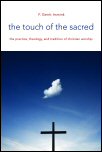
All over the world Christian communities meet on Sunday morning for worship. But what really happens during a worship service? How do worshipers participate in the service? What does it mean to sing, pray, and celebrate the Lord’s Supper together? What do worshipers do when they listen to a sermon?
In The Touch of the Sacred, F. Gerrit Immink offers thoughtful theological reflection on the religious practice of worship services in the Protestant tradition. He develops a theology of worship with a clear focus on the death and resurrection of Jesus Christ as he explores the meaning of worship, the mystery of Christ, the sacraments, prayer, and preaching. Ultimately, he says, something dynamic happens when a church congregation speaks and acts; it is touched by the sacred, by a very encounter with the living God.
What makes Immink’s Touch of the Sacred stand out from the crowd is the remarkable way in which he brings things together. He brings together a theological approach to the liturgy with a practical approach. He brings together a deep immersion in the liturgical writings of continental authors with an equally deep immersion in the liturgical writings of American authors. And he brings together a rich knowledge of the history of liturgy with wide acquaintance with contemporary liturgical practices. . . . Immink never stays on the surface; his discussion is always probing. A valuable contribution.
—Nicholas Wolsterstorff, Noah Porter Emeritus Professor of Philosophical Theology, Yale University
In the press to produce services that are innovative, expressive, entertaining, and blended, the cultural and theological roots of worship have become a forgotten and untraveled country. Gerrit Immink here delves deeply into the particular resources of the Reformed tradition to rediscover landmarks for worship, prayer and preaching that is godly rather than all about us. His volume will repay careful reading and does much to redress the balance.
—Iain R. Torrance, pro-chancellor, University of Aberdeen
F. Gerrit Immink is rector and professor of homiletics at Protestant Theology University, Groningen, Netherlands. He is also the author of Faith: A Practical Theological Reconstruction.
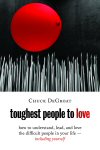
People—frustrating, confusing, disappointing, complicated—are the most difficult part of leadership. They challenge leaders everywhere, from leaders of many to managers of a few. In this book, Chuck DeGroat addresses the flawed nature of people and offers wisdom for leaders of all types in dealing with anyone who is difficult to lead and to love.
Toughest People to Love explores the basics of how people “tick,” encouraging leaders to examine and take care of themselves so that they can better understand and care for others. Based on DeGroat’s wealth of experience as a pastor, professor, and therapist, this book—both wise and practical—is one that countless leaders will go back to time and again for valuable insights and renewed vision.
Chuck DeGroat combines thoughtful reflection with psychological learning and spiritual vision. This book will give wise guidance to anybody who is called to lead.
—John Ortbert, author, Who Is This Man? and The Me I Want to Be
Sometimes one discovers a book so helpful and profound that it never collects dust on one’s bookshelf. Toughest People to Love is that kind of book, and I will refer to it often. Here you will find accurate, insightful diagnosis and practical, biblical remedy. As a difficult person who deals often with difficult people, I find this to be a wonderful and life-changing book. Read it and be glad!
—Steve Brown, author, Three Free Sins: God Isn’t Mad at You
Toughest People to Love is overflowing with wisdom and compassion. This is a book that I need personally, that I will assign in my seminary courses, and that will be an important resource as I develop leaders for the diocese in which I serve. . . . It is part self-awareness guide, part handbook on soul care, part leadership treatise, and part consultation on dealing with difficult people in the church.
—Justin S. Holcomb, adjunct professor of theology, Reformed Theological Seminary
This brilliant book is a road map through the morass of convoluted relationships we all face in our families, neighborhoods, work, and ministries. . . . I wish I’d had this indispensable resource — a life-giving well — much earlier in my life. I will return often to it.
—Dan B. Allender, author, The Wounded Heart and Leading with a Limp
Toughest People to Love will make you a better leader, pastor, parent, and friend. But more than anything else, this book will guide you down a path of personal renewal and give you a new trajectory in your own journey to wholeness and integration. This is a book to read again and again as we seek to love the beautiful and broken people in our lives, including the person we see when we look in the mirror.
—Fred Harrell, senior pastor, City Church of San Francisco
This wise and winsome book on leadership takes us on a journey into the challenges and complexities of difficult relationships—with others and with ourselves. Reflecting the Christian wisdom that suffering can lead to human flourishing, DeGroat points us to the rest beyond bodily rest found paradoxically in the solitude and the deepening community with others that together center us in God.
—Eric Johnson, director, Society for Christian Psychology
Chuck DeGroat clearly understands the realities of pastoral ministry. This book is both theologically robust and practical and therefore takes a well-rounded approach to human formation. It will substantially help those who want to understand what Christian leadership, counseling, and friendship really mean.
—Tyler Johnson, lead pastor, Redemption Gateway Church, Mesa, AZ
Chuck DeGroat is associate professor of pastoral care and counseling at Western Theological Seminary, Holland, Michigan. He is former teaching pastor of City Church, San Francisco and executive director of City Church’s counseling center.
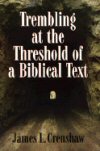
This eloquent and penetrating book brings together 20 brief yet powerful sermons that illustrate the move from text to interpretation. Author James L. Crenshaw reflects on the agony and ecstasy of faith in God amid life’s adversity. An accompanying selection of meditations also explores the complex terrain of the spiritual journey, and a brief collection of deeply reverent prayers draws the volume to a close, showing that the one who boldly directs hard questions toward heaven also tarries long enough to pray.
James L. Crenshaw is the Robert L. Flowers Professor of the Old Testament at Duke University Divinity School.
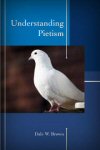
Dale Brown began his study of pietism nearly 40 years ago, “during the height of the ascendancy of the bitterly anti-pietistic neo-orthodox scholasticism.” At that time pietism was a bogey implying moralism, subjectivism, emotionalism, and a host of other such “-isms.” Brown set about to assess pietism in its historical situation, and to clearly define it as a term describing a historical movement instead of a group of traits present in contemporary Christianity. Today many Christians are looking to pietism for answers to the problems of postmodernism. The new revision of this classic work will give scholars and laypersons excellent insight into the significant theological movement of pietism.
Dale W. Brown is professor emeritus at Bethany Theological Seminary. His other works include Biblical Pacifism and Another Way of Believing: A Brethren Theology.
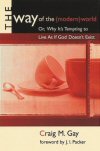
This telling critique of the modern world not only exposes the foundational worldview of contemporary secular society and the ideas that undergird modern culture, but it also shows how, for Christians, one of the most insidious temptations fostered by these ideas is the enticement of “practical atheism.” Craig Gay describes the powerful ideas that have built today’s modern complex, exposes the deeper assumptions that lie beneath modern values like “freedom” and “progress,” and shows how these ideas can easily lead us to live as though God does not matter. He also points out the link between modern secularity and the impersonal quality of contemporary social life, suggesting that the classical Trinitarian defense of personhood can best resolve the stubborn problems of life today. Arguing for the eviction of certain destructive modern ideas from our churches, Gay’s work demonstrates a biblically sound way to live in—but not of—the world.
This book was waiting to be written, and Craig Gay has brought his considerable expertise to bear in writing it. He has given us a thorough, far-reaching analysis of the modern world that raises an awkward question Christians may not wish to ask: How should we think and live in such a world? If we do not know how to answer that question, however, we do not know what it means to be Christian.
—David F. Wells, distinguished senior research professor, Gordon-Conwell Theological Seminary
Gay joins erudition to lucidity in exploring the soulessness of a modernity blind to the ultimately personal character of all that is. This is cultural and intellectual criticism of a high order, an invitation to the clear thinking that opens a way for faith.
—Richard John Neuhaus, editor in chief, First Things
Gay’s survey of the many dimensions of the modern secular ethos is a tour de force. It masterfully dissects the components of the modern secular worldview in its political, technological, economic, cultural, and theological expressions. Yet this remains a profoundly hopeful book as its Christian viewpoint inescapably indicates.
—David Wash, professor, department of politics, Catholic University of America
Craig M. Gay is associate professor of interdisciplinary studies at Regent College, Vancouver, British Columbia.
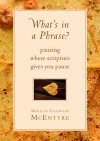
Well-known biblical phrases—“in the fullness of time,” “fearfully and wonderfully made,” “in the beauty of holiness,” and others—suggest, evoke, and invite. In this book Marilyn Chandler McEntyre succinctly reflects on more than 50 of these familiar phrases that prompt readers to pray, pause, and pay attention.
Some of these select phrases are devotional, some speculative, some whimsical, some edgy. McEntyre encourages us to see such “words within the Word” as invitations and, in doing so, to discover that they are places of divine encounter, epiphany, and unexpected guidance.
The three sections of the book—“Assurance,” “Invitation,” and “Surprise”—organize the reflections by tone and theme. Rich with eloquence, wisdom, and wonder, these reflections will lead readers to enter the sacred space of Scripture and connect the biblical Word with the ordinary—and extraordinary—lives we’ve been given to live.
With her profound summonings, Marilyn Chandler McEntyre recovers for many contemporary readers an ancient practice that is reminiscent of rabbinic attention to the dark sayings of Scripture, those compelling, curious, often challenging passages that would nudge us into seeing more, would have us glimpse the inexhaustibility of the one in whom we live and move and have our being, even the inexhaustibility of his Word.
—Scott Cairns, author, Idiot Psalms
McEntyre has again written with conspicuous grace and truth. She sees deeply into the Christian life. She writes simply and nobly, but with an enormous weight of discernment and suggestion. Some passages here are as powerful and lovely as any I’ve encountered in years.
—Cornelius Plantinga Jr., author, Reading for Preaching: The Preacher in Conversation with Storytellers, Biographers, Poets, and Journalists
Seamlessly blending exegesis, philology, lectio divina, and prayer, Marilyn Chandler McEntyre teaches us how to listen for the divine word in all times and circumstances.
—Carol Zaleski, coauthor, Prayer: A History
Marilyn Chandler McEntyre is a fellow of the Gaede Institute for the Liberal Arts at Westmont College, Santa Barbara, California. She also teaches at the University of California, Berkeley. McEntyre is also the author of Drawn to the Light: Poems on Rembrandt’s Religious Paintings, In Quiet Light: Poems on Vermeer’s Women, and Patient Poets: Illness from Inside Out.
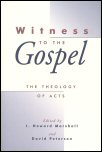
A distinguished group of scholars here provides a comprehensive survey of the theology of the early church as it is presented by the author of Acts. These 25 essays, designed to show the current state of scholarship in ways accessible to students of the New Testament, discuss the main themes in the theology of Acts: God’s plan of salvation, the call of God and the spreading of the Word, the renewing work of the Holy Spirit, the relationship of Jews and Gentiles in the church, and more.
Although the literature base for Luke-Acts studies has grown impressively during the last decade, this volume surely merits careful consideration for its unique goal and composition. . . . For serious readers of Acts this book will prove helpful in identifying thematic streams running through the narrative and in developing an understanding of how various approaches to creating a theology of the Book of Acts lead to differing, yet complementary, conclusions.
—Bibliotheca Sacra
A very valuable work. There is a wealth of insightful theological material here. It will be very enriching to anyone pursuing the study of Acts.
—Calvin Theological Journal
This book provides us with valuable examinations of numerous themes in Acts.
—Religious Studies Review
The book makes an important contribution to the specialist study of Acts at the same time as providing a foundation teaching tool.
—Journal of Theological Studies
I. Howard Marshall is professor emeritus of New Testament exegesis and honorary research professor at the University of Aberdeen, Scotland. His many books include New Testament Theology: Many Witnesses, One Gospel and Beyond the Bible: Moving from Scripture to Theology.
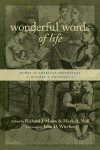
While many evangelical congregations have moved away from hymns and hymnals, these were once central fixtures of the evangelical tradition. This book examines the role and importance of hymns in evangelicalism, not only as a part of worship but as tools for theological instruction, as a means to identity formation, and as records of past spiritual experiences of the believing community.
Written by knowledgeable church historians, Wonderful Words of Life explores the significance of singing hymns in many dimensions of American Protestant and evangelical life. The book focuses mainly on church life in the United States but also discusses the foundational contributions of Isaac Watts and other British hymn writers, the use of gospel songs in English Canada, and the powerful attraction of African-American gospel music for whites of several religious persuasions. This volume also includes appendixes on the American Protestant Hymn Project and on hymns in Roman Catholic hymnals.
At least since the time when Paul and Silas sang from the depths of the Philippian jail, praising God with hymns has been central to the Christian faith. Isn’t it odd, then, that so little careful study has been devoted to popular hymnody? True religion, Jonathan Edwards once said, can never be doctrinal knowledge only, ‘without affection.’ Vital faith is rather ‘a ferment, a vigorous engagedness of the heart.’ Few human acts can so powerfully fuse heads, hearts, hands, and voices like singing, and these authors show how multidimensional vocal praise has been. For American Protestants, hymn singing is nearly sacramental; it also can be political. Hymn singing expresses theological ideas, challenges common wisdom, defines and enacts community, and roots the gospel in culture. Wonderful Words of Life models the kind of scholarship we need for every time and place where Christianity has gone, to understand the powerful effects of ordinary people singing praise to God.
Joel Carpenter, director, Nagel Institute for the Study of World Christianity, Calvin College
Collections of scholarly essays typically gather dust, their spines hardly cracked, their pages pristine and unread. By contrast, copies of this superb book will soon be as well-thumbed as your grandmother’s hymnal. If you want to understand the evangelical stream of what gets called ‘religion in practice’ these days, there’s no better place to start.
John Wilson, P.C. Rossin Professor of Church History at Pittsburgh Theological Seminary
This stimulating collection provides much-needed coverage and enrichment in a neglected sector of American religious experience. The thoughtful and thought-provoking essays do not ‘their own appointed limits keep,’ but venture in illuminating ways beyond the American scene and beyond evangelical Protestantism. Teachers of cultural and religious history will be indebted to these authors.
—William Hutchison, Charles Warren Professor of the History of Religion in America, Emeritus, Harvard University
A welcome addition to our knowledge and evaluation of important strands of American hymnody.
—Journal of the American Academy of Religion
Richard J. Mouw is distinguished professor of faith and public life and former president of Fuller Theological Seminary, Pasadena, California.
Mark A. Noll is Francis A. McAnaney Professor of History at the University of Notre Dame. His other books include The Scandal of the Evangelical Mind and Turning Points: Decisive Moments in the History of Christianity.